Презентация lect.4 LEXICAL PROBLEMS OF TRANSLATION

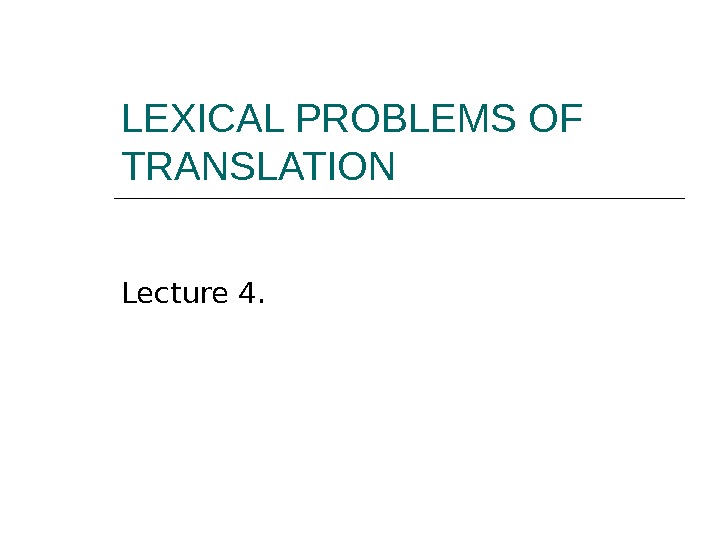
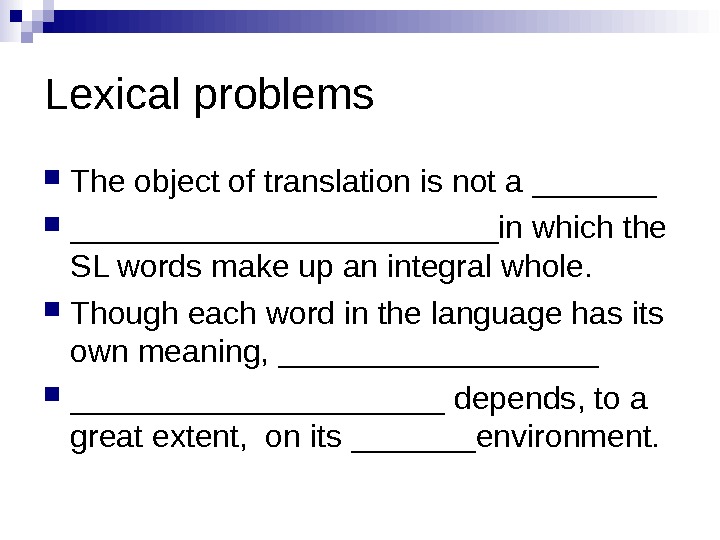
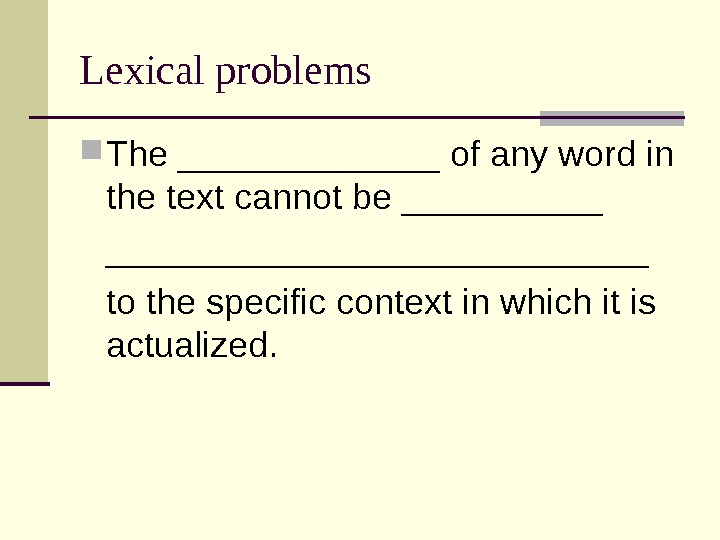
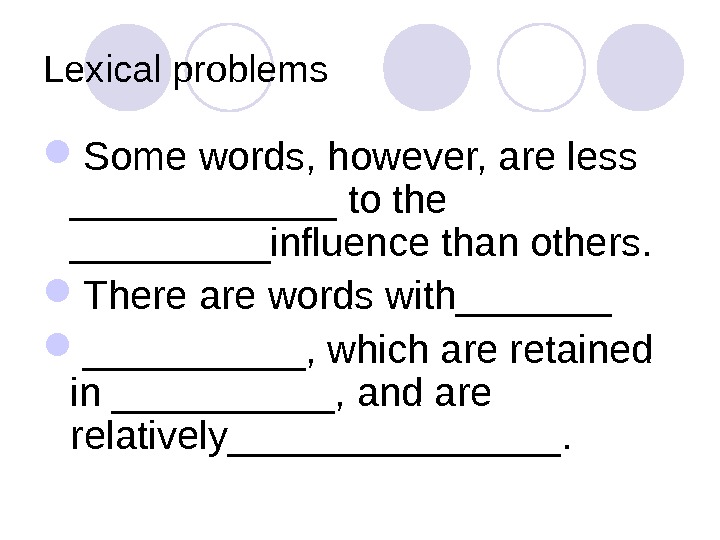
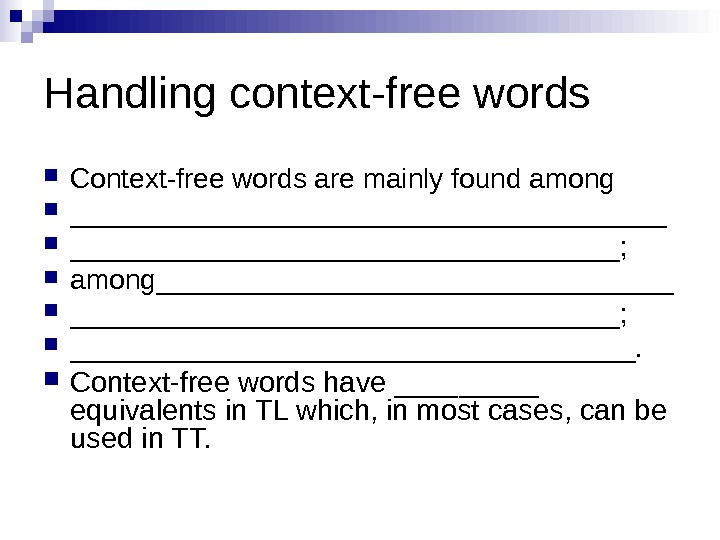
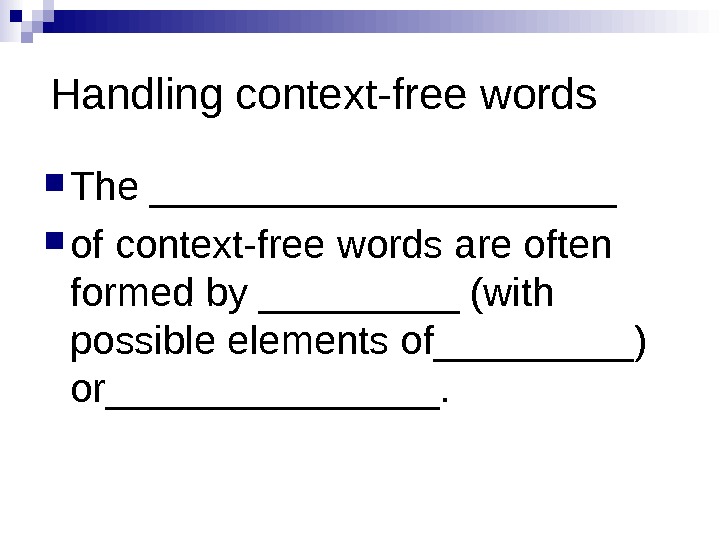
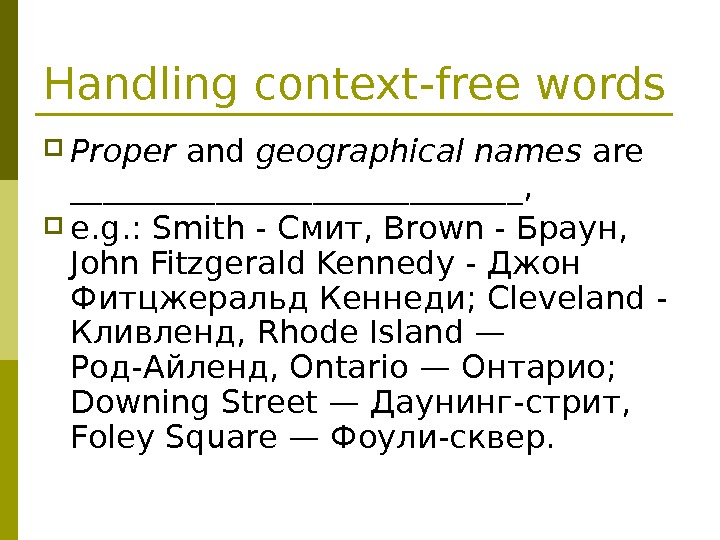
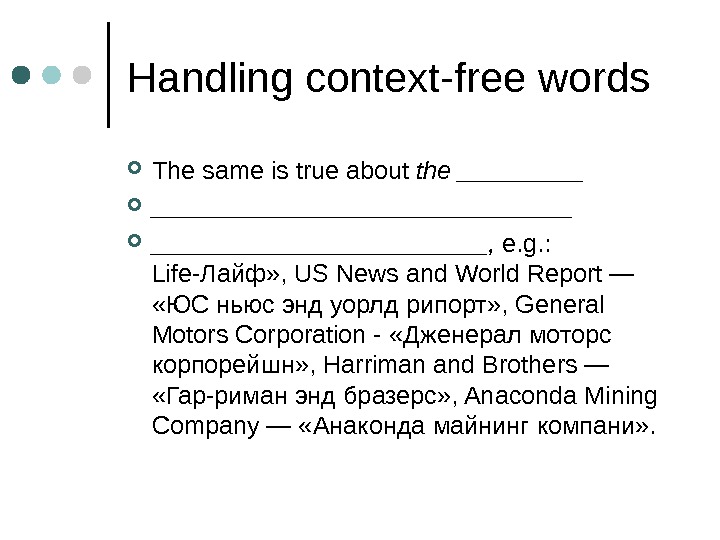
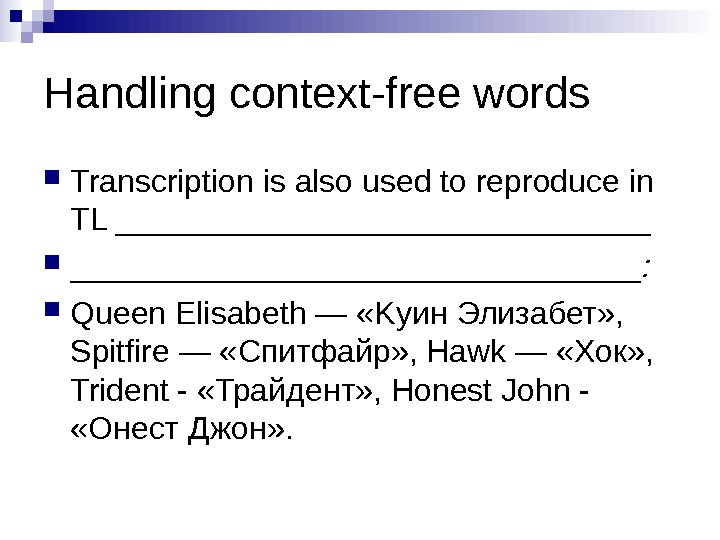
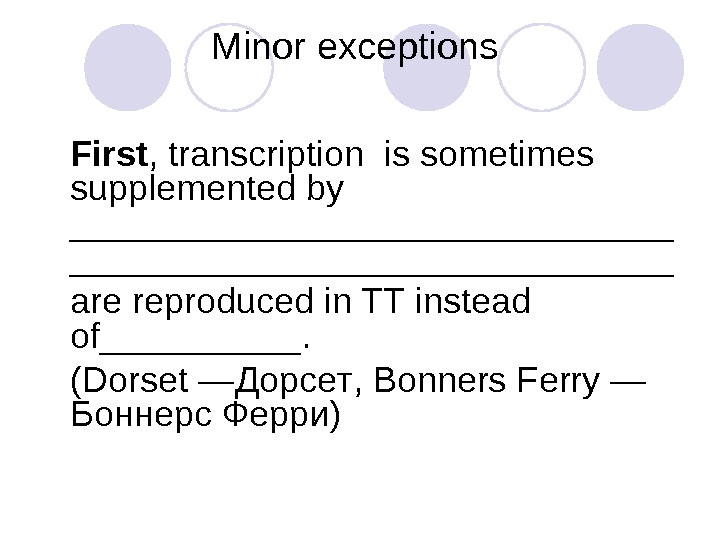
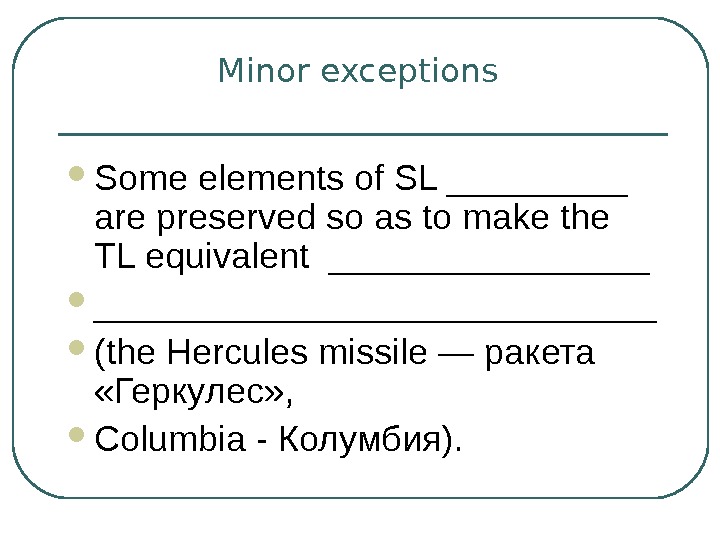
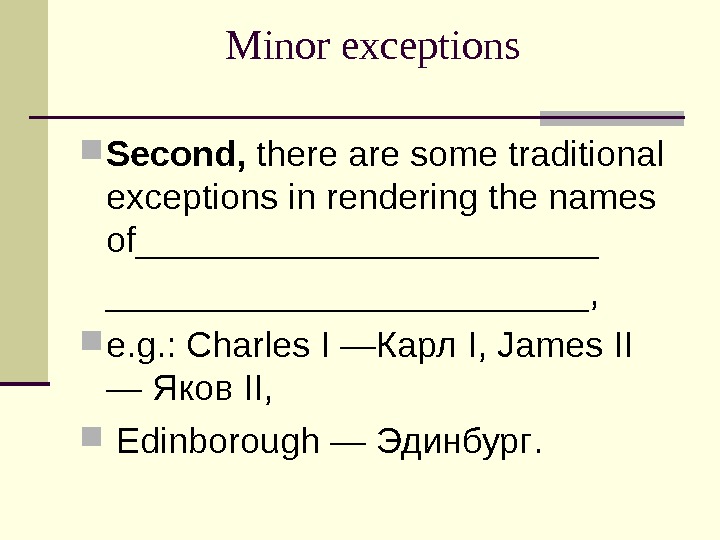
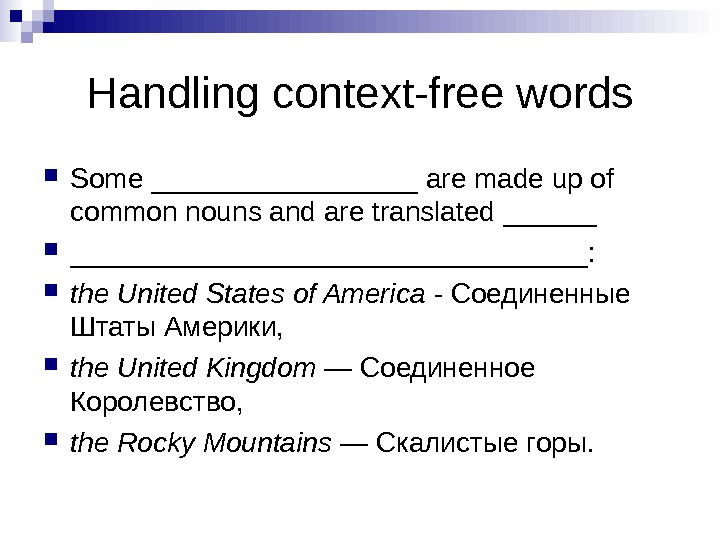
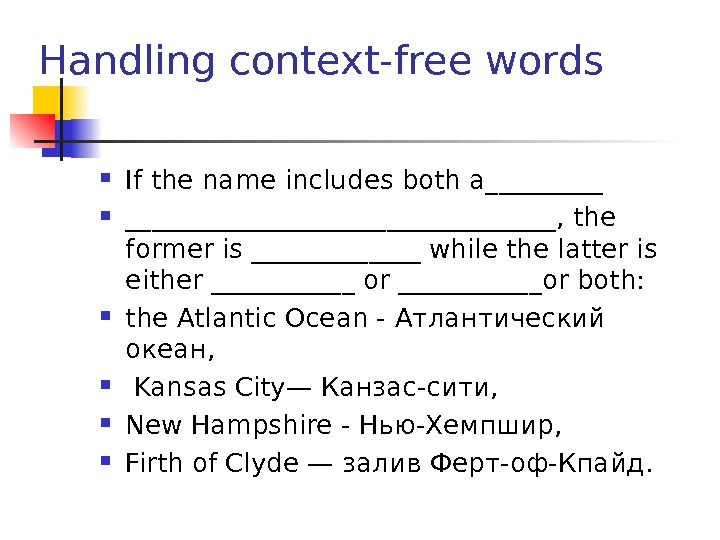
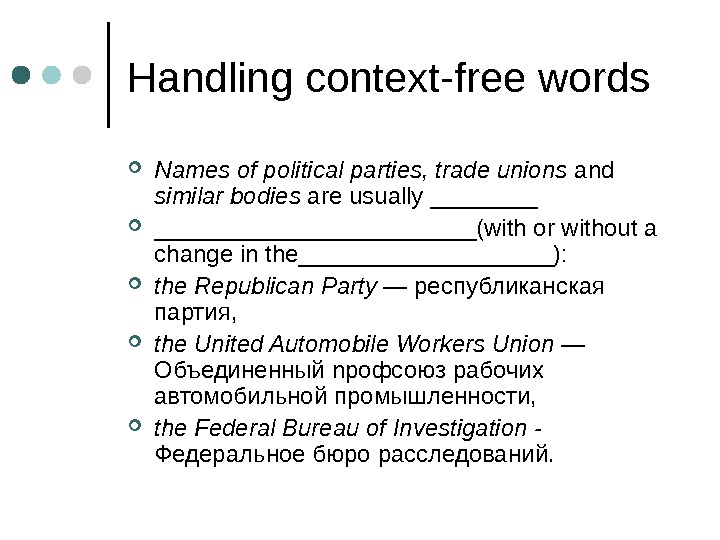
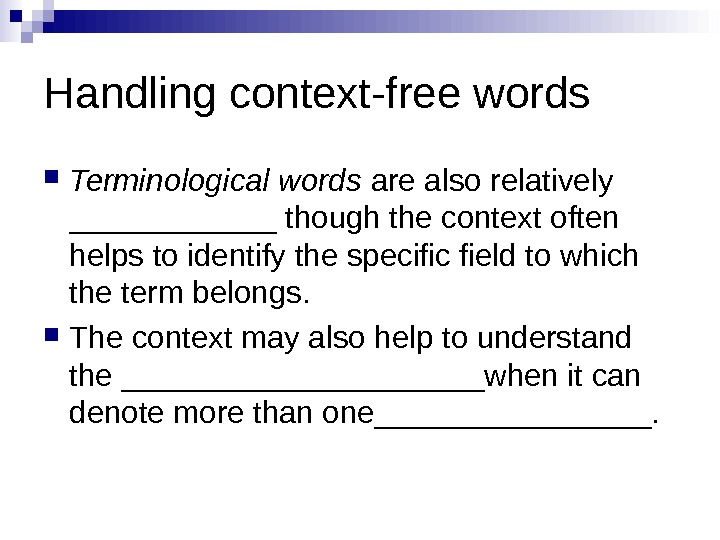
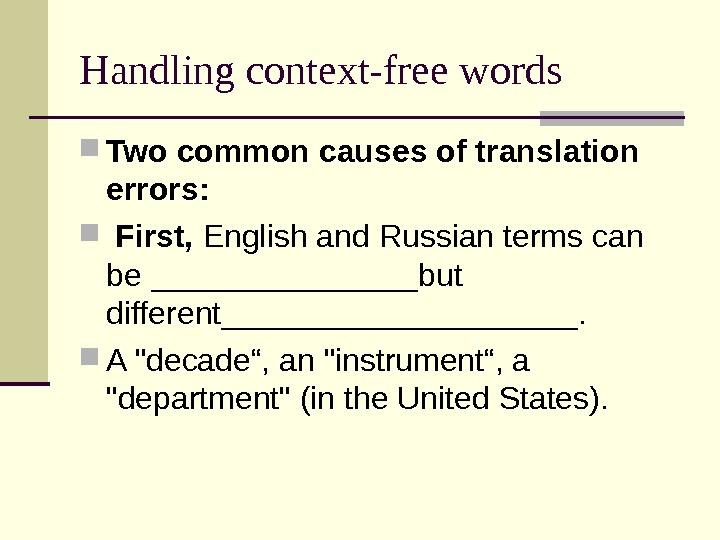
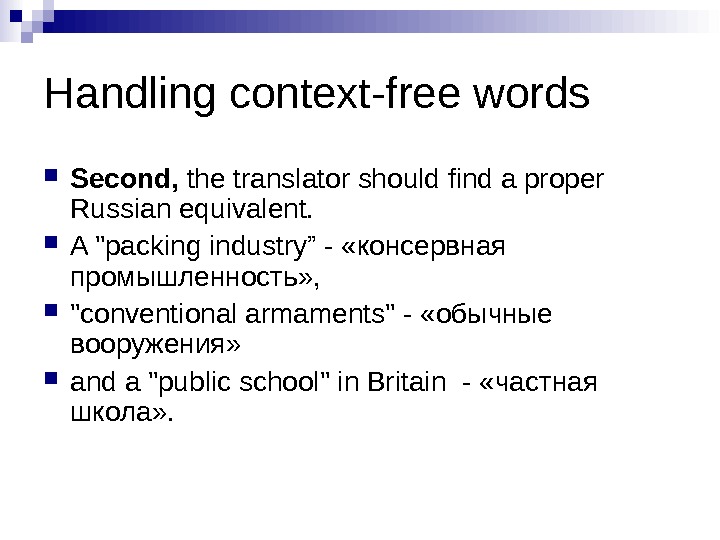
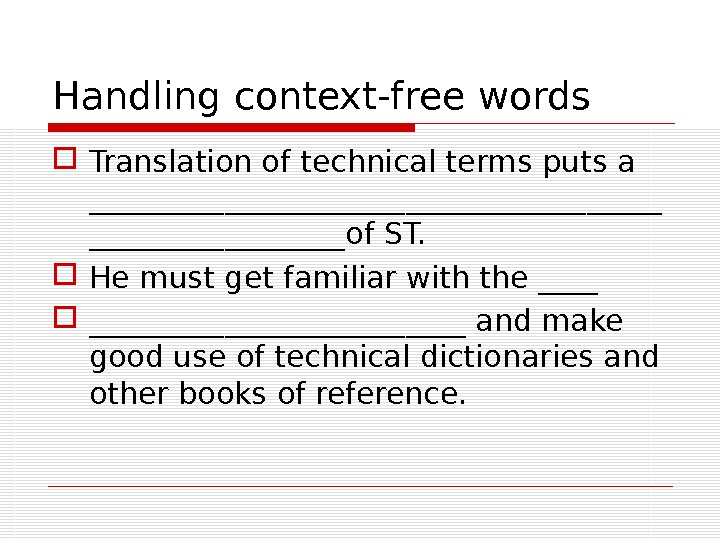
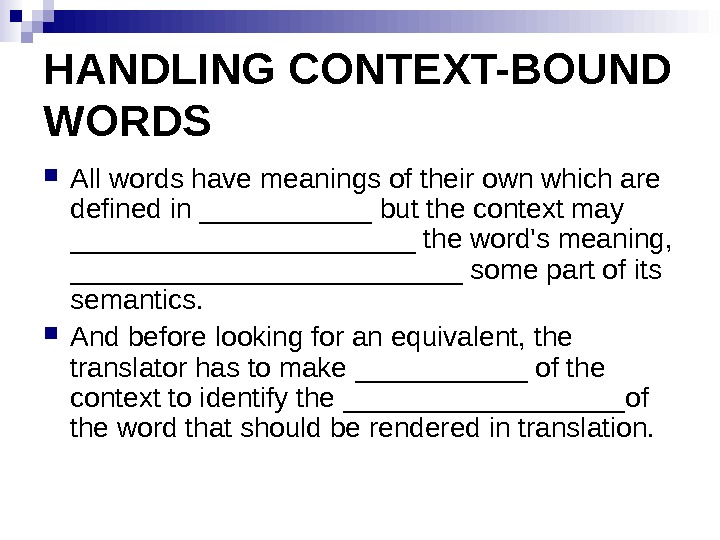
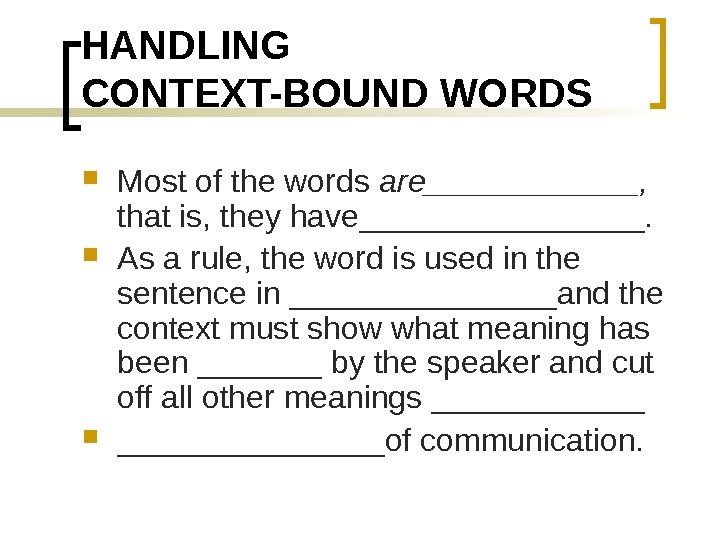
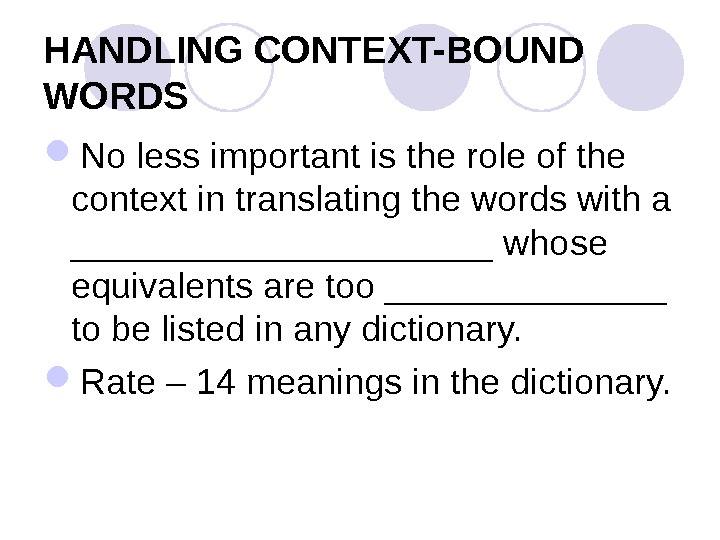
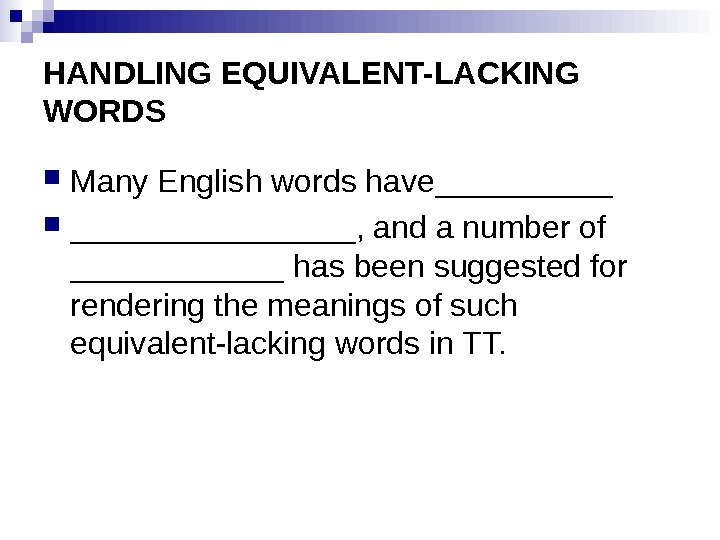
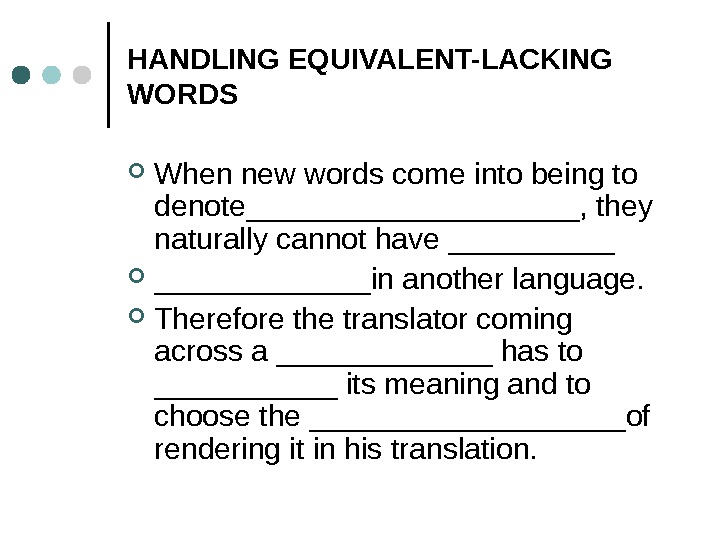
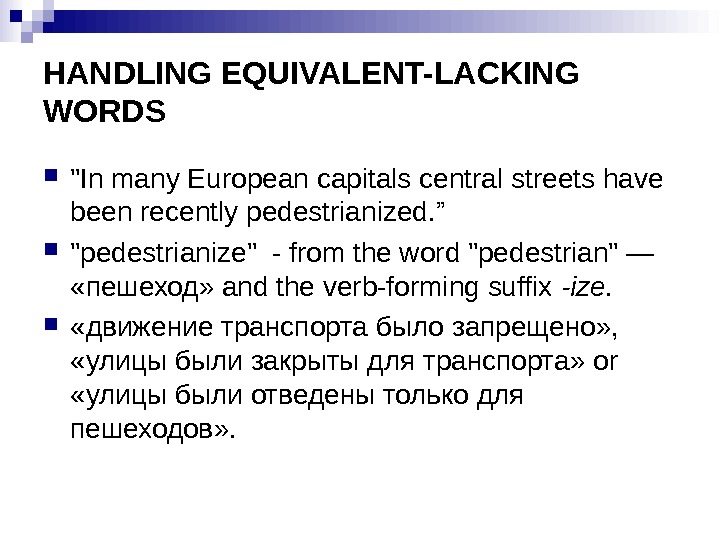
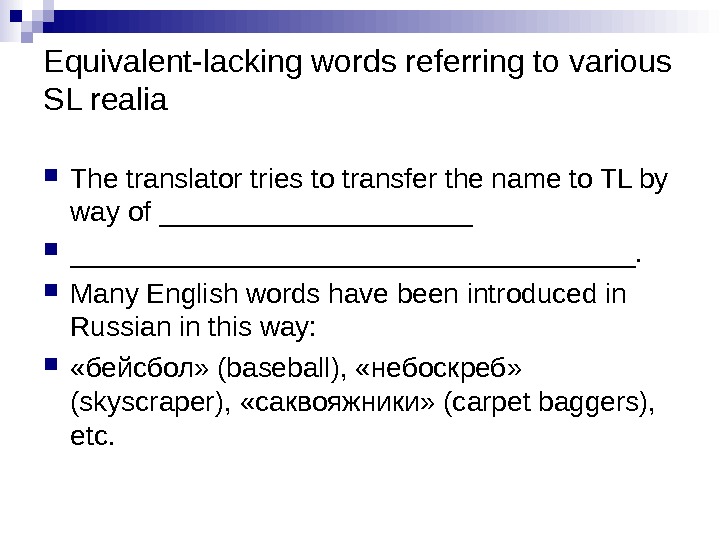
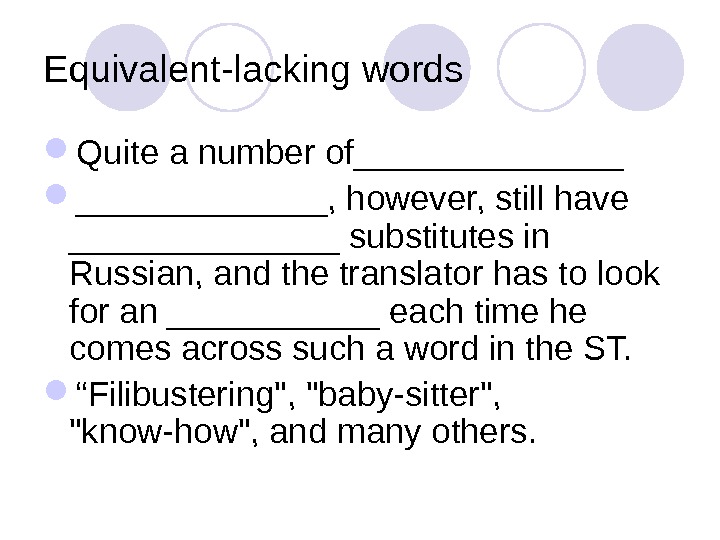
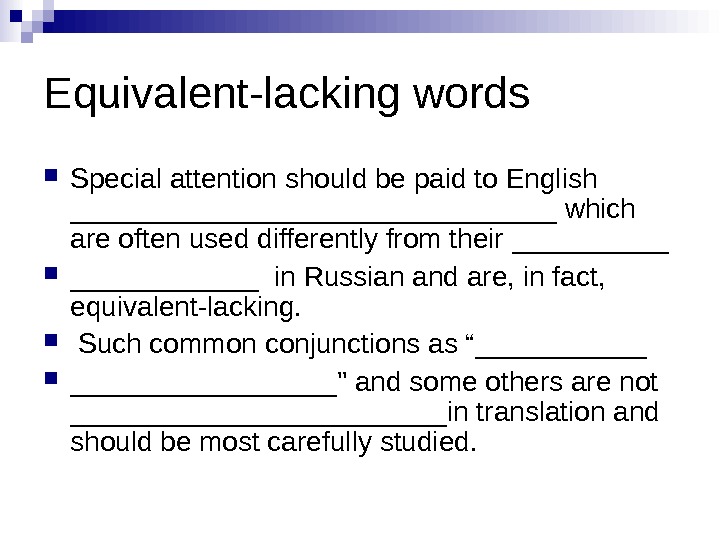
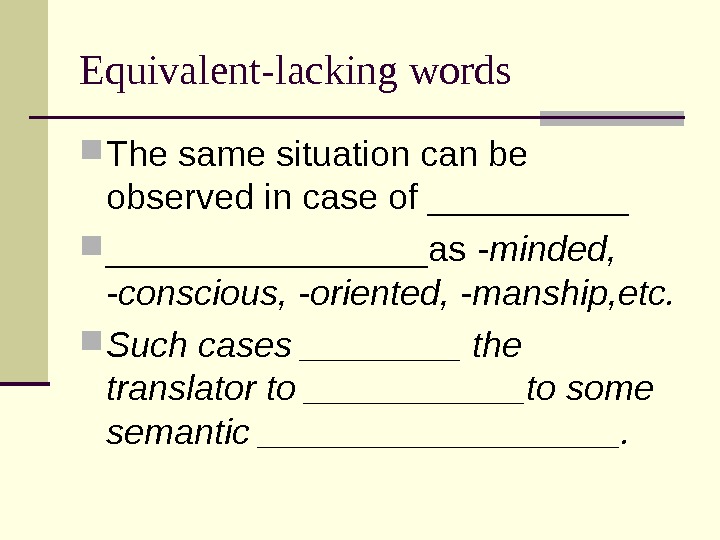
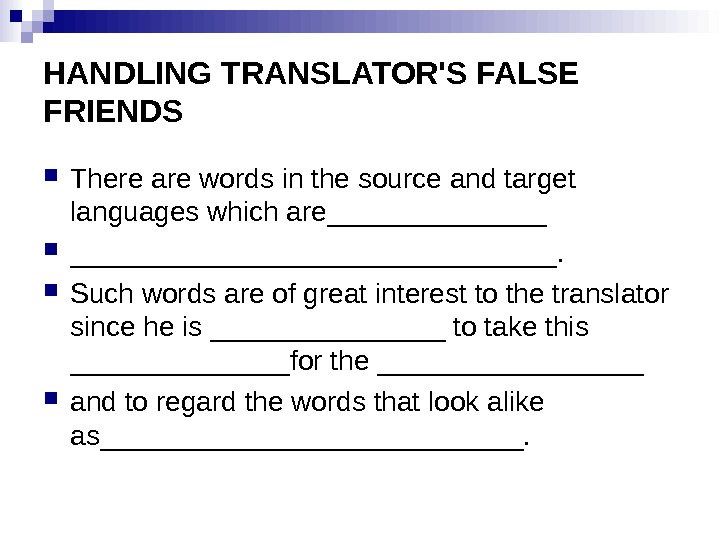
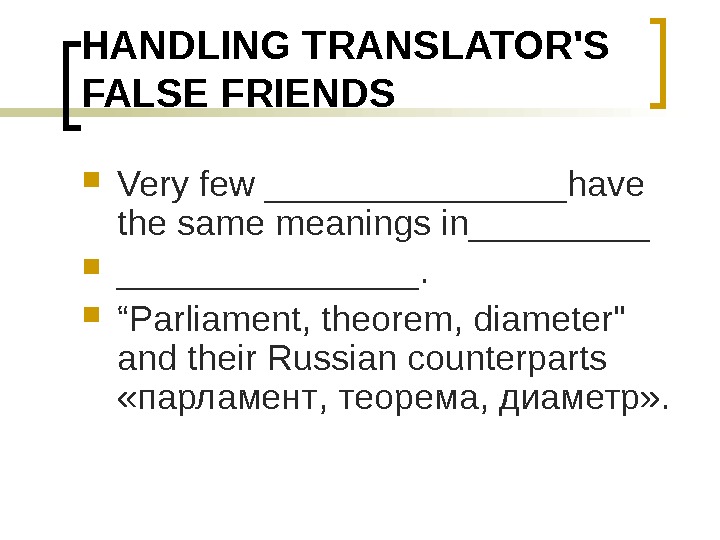
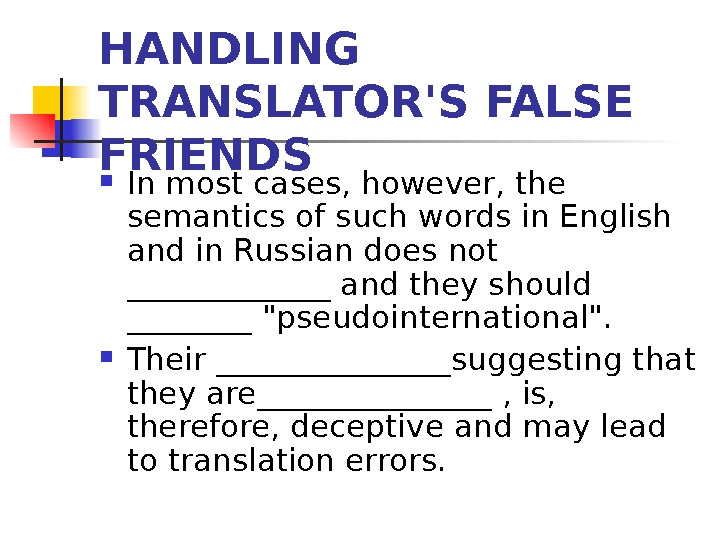
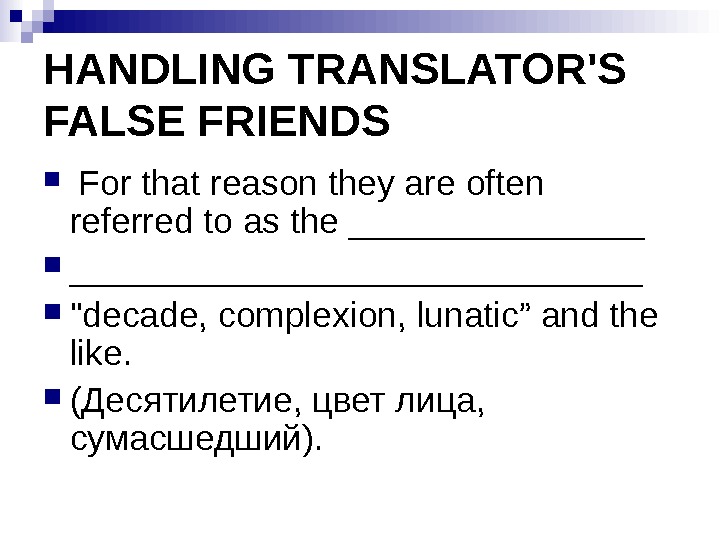
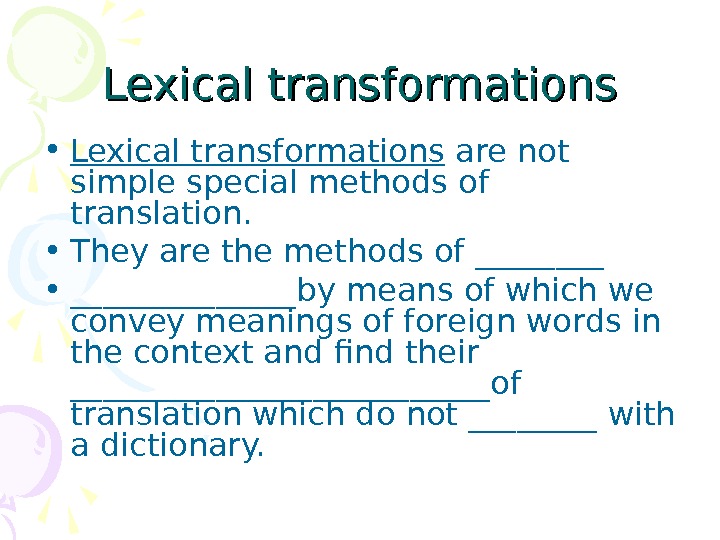
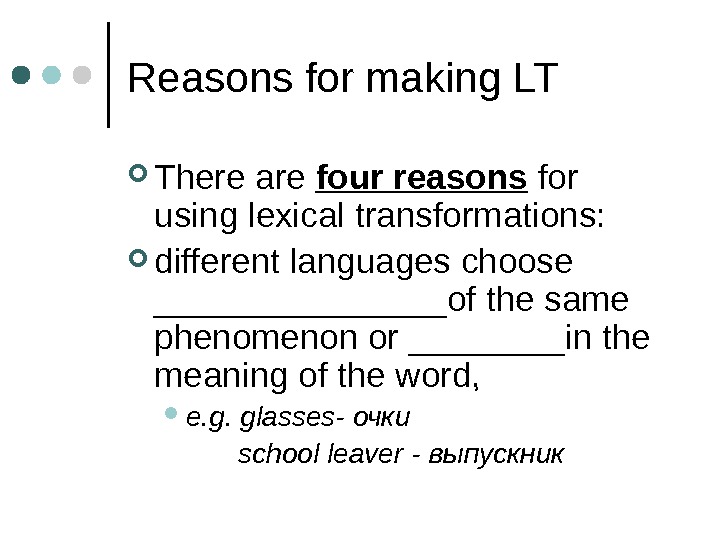
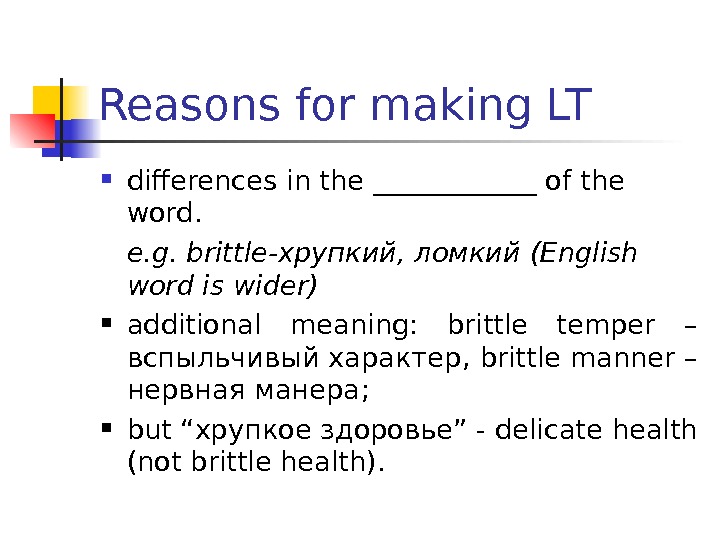
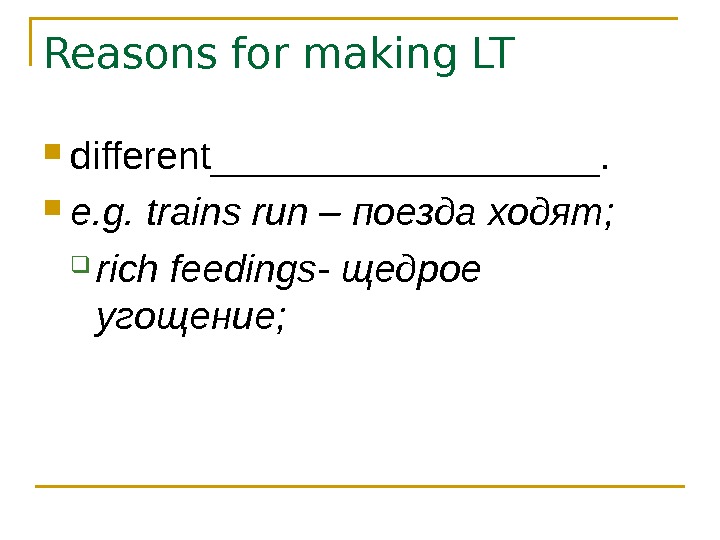
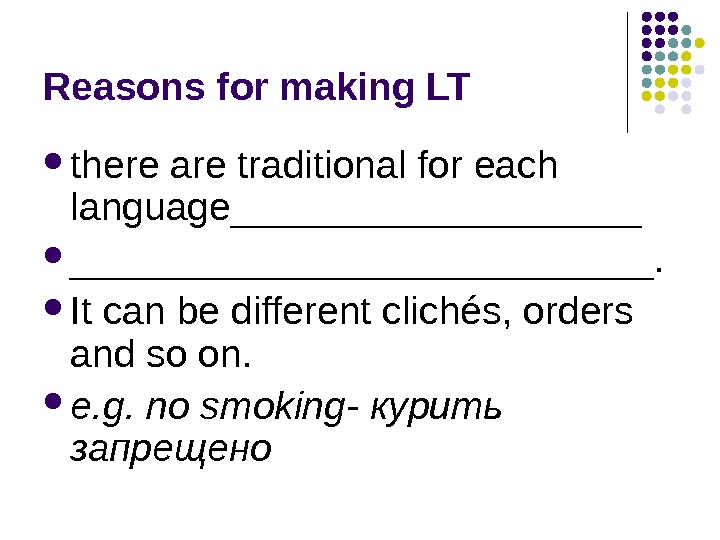
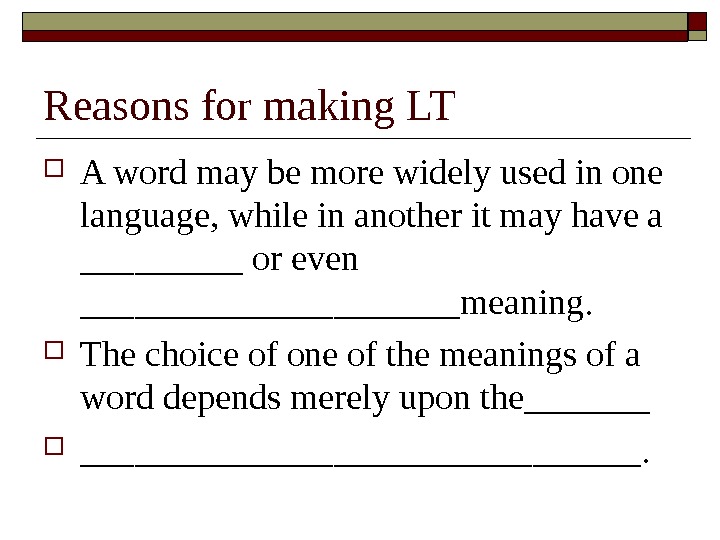
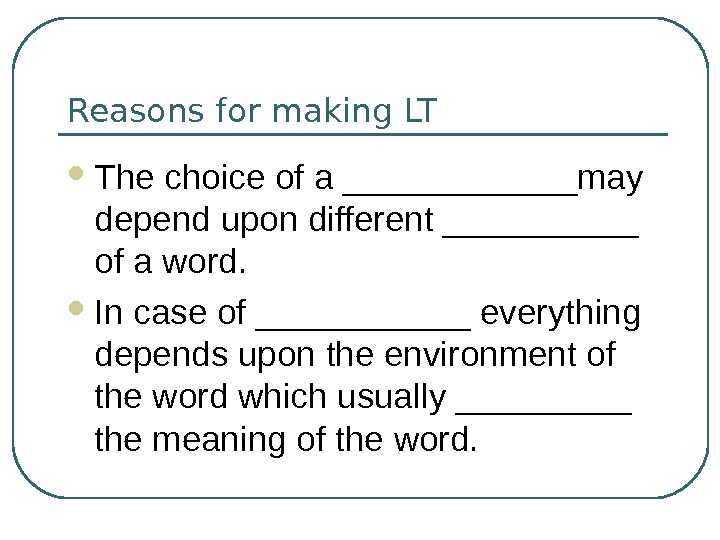
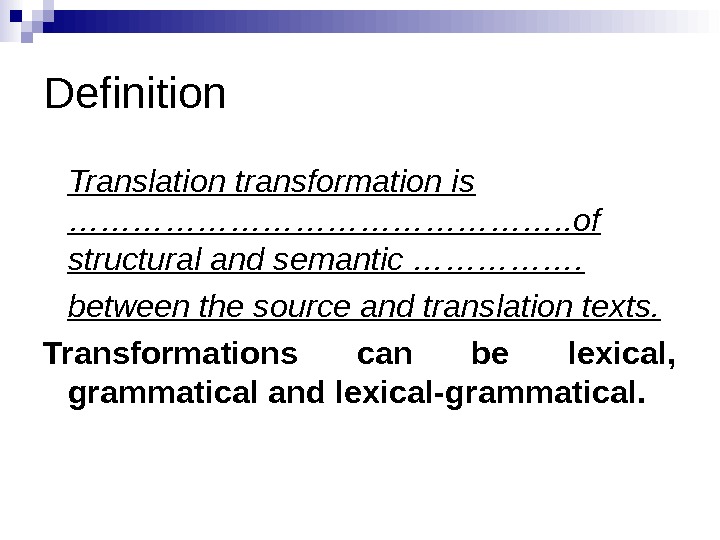
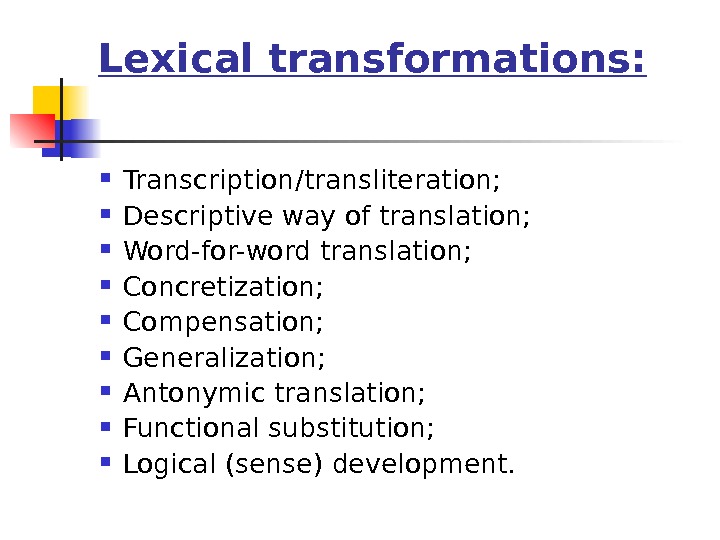
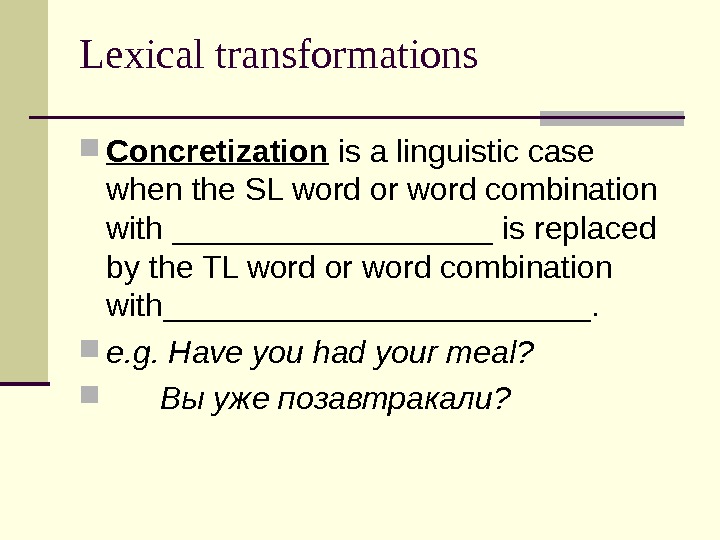
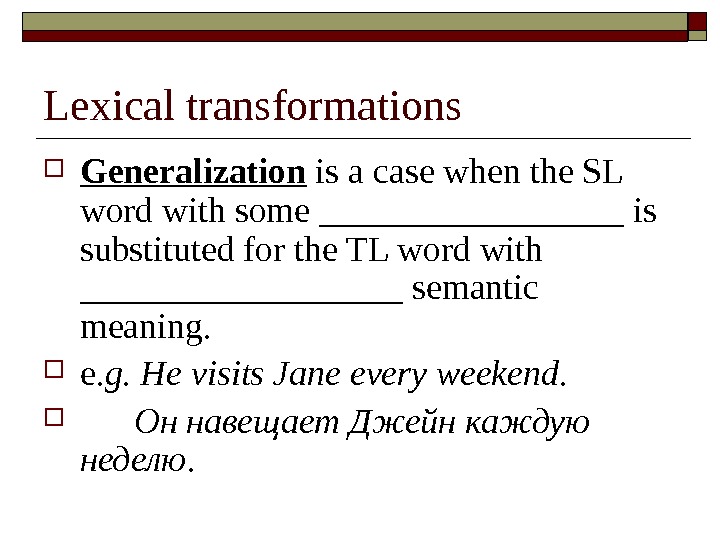
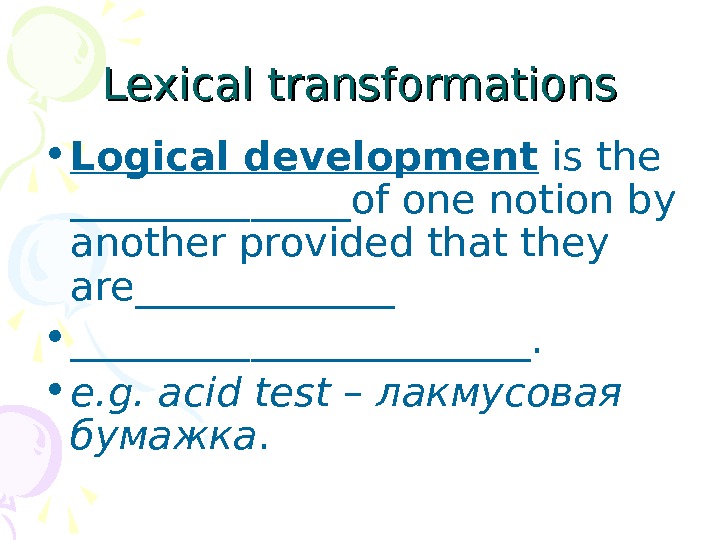
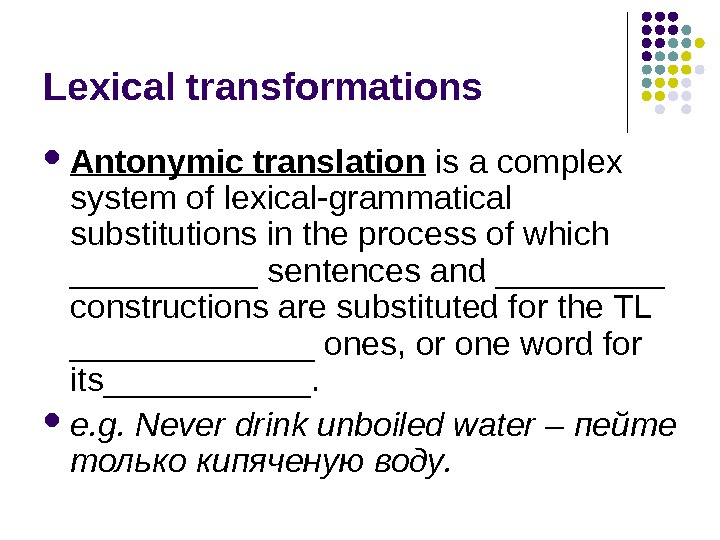
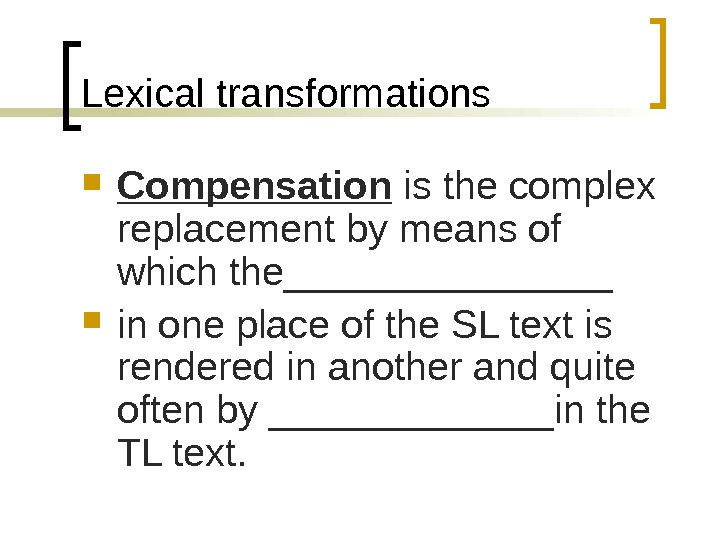
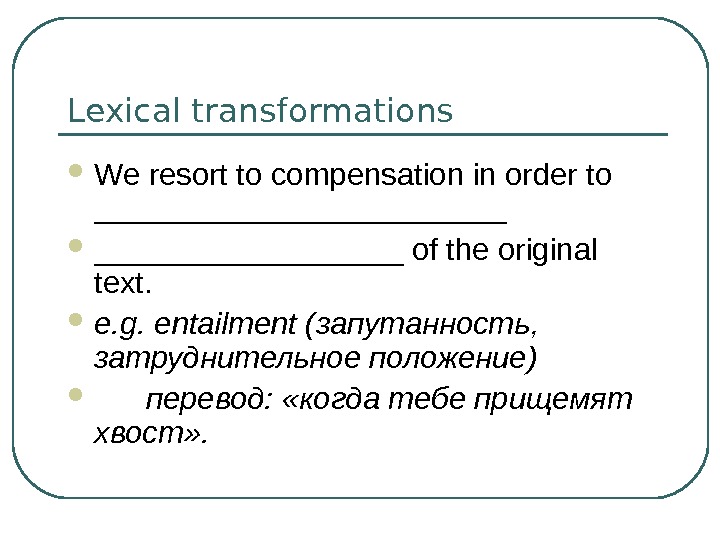
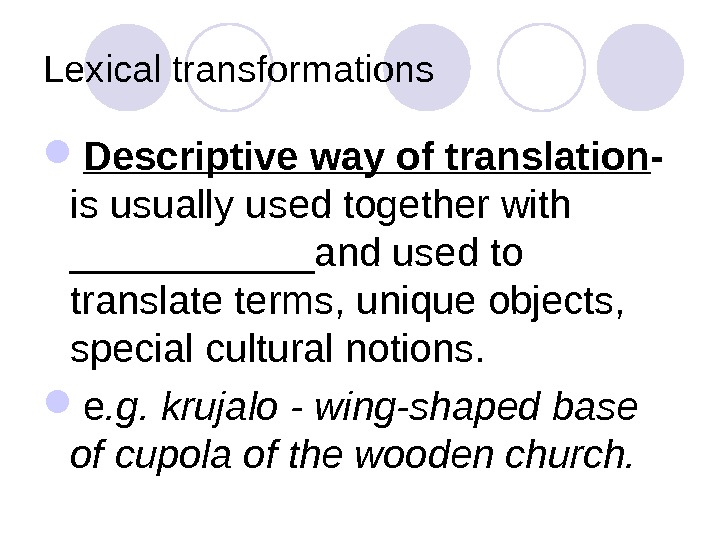
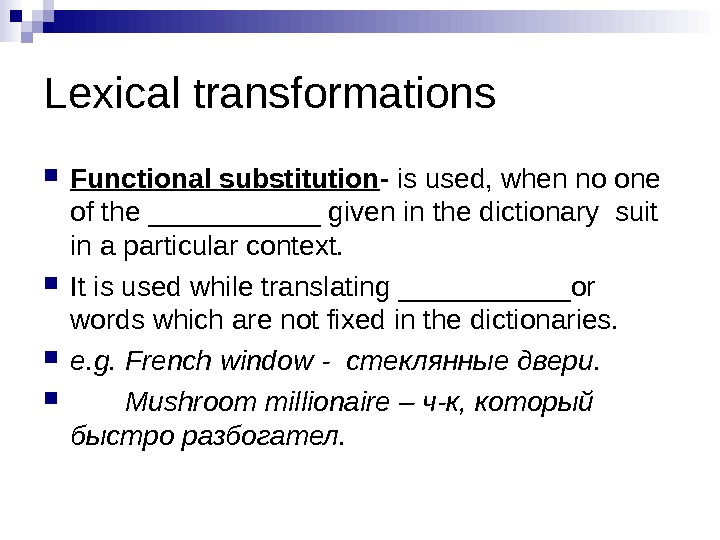
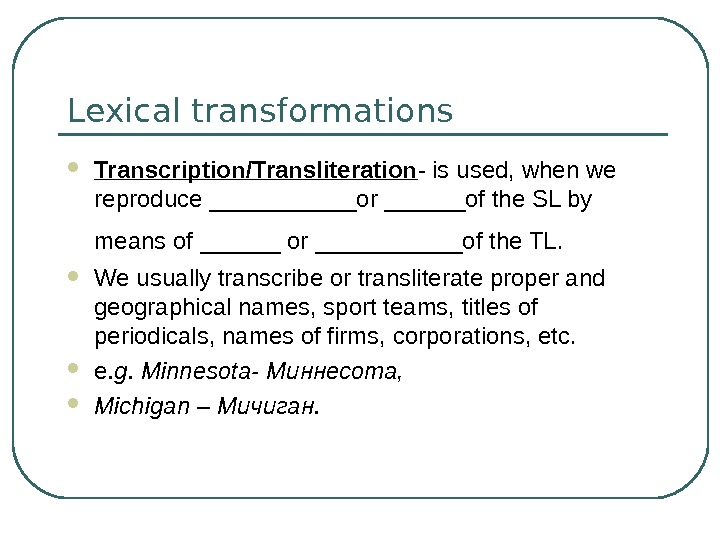
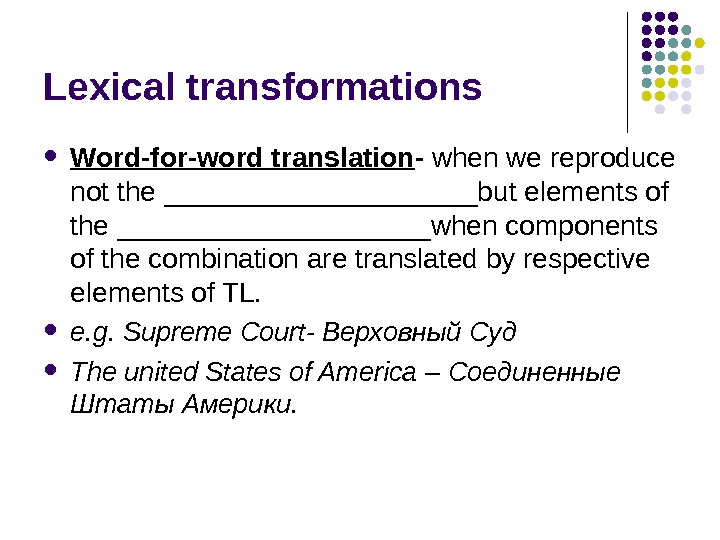
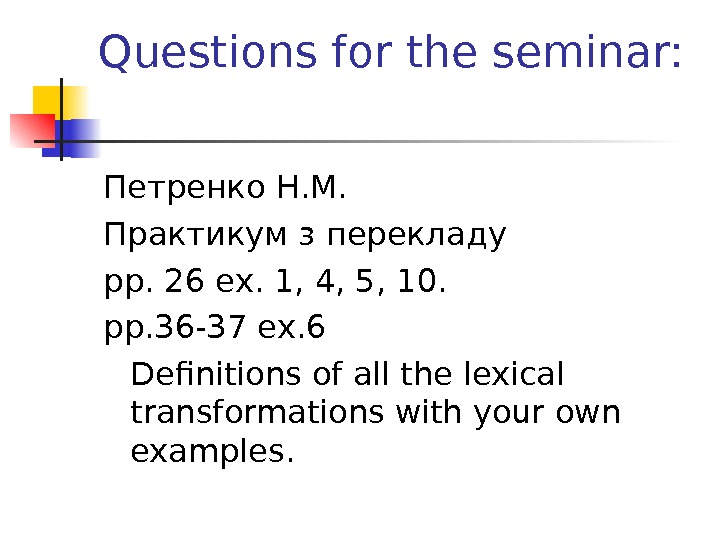
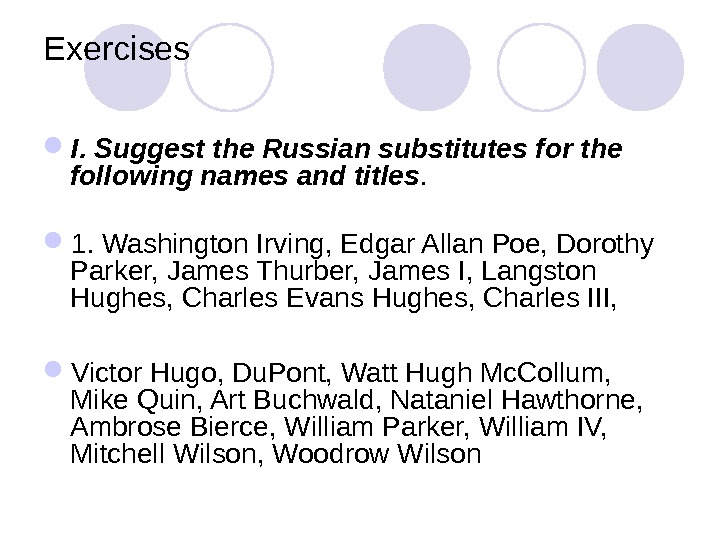



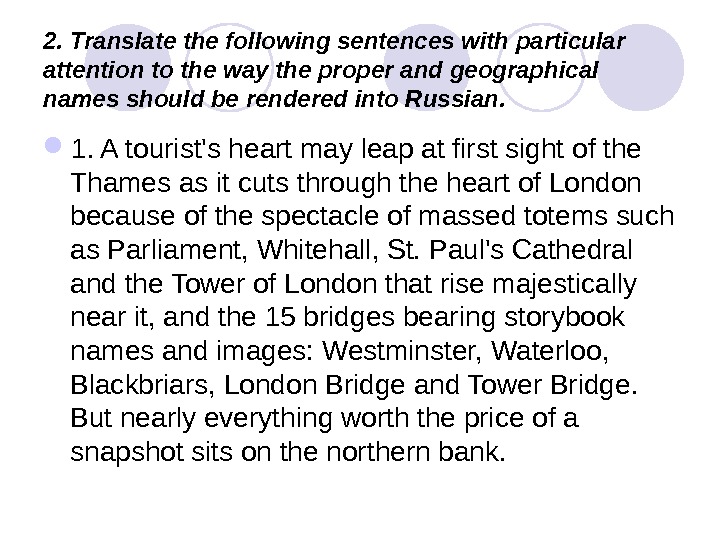

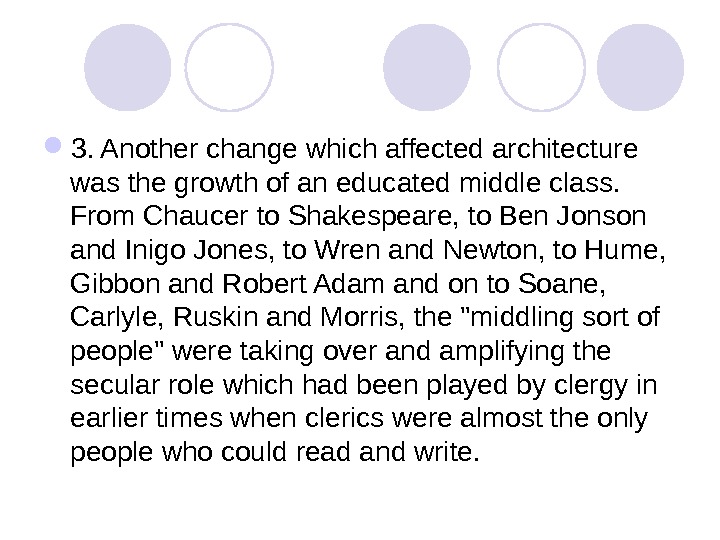
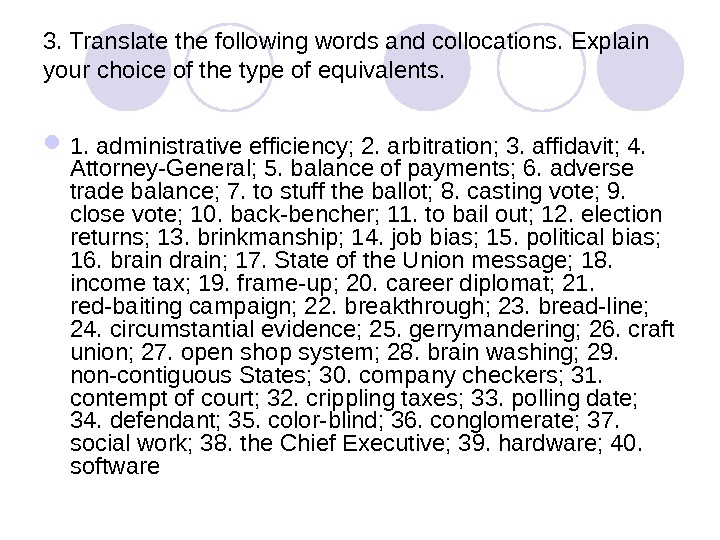
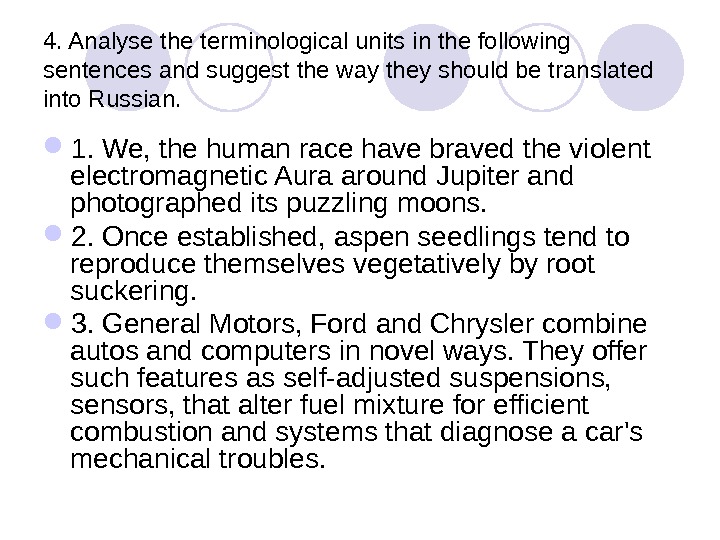
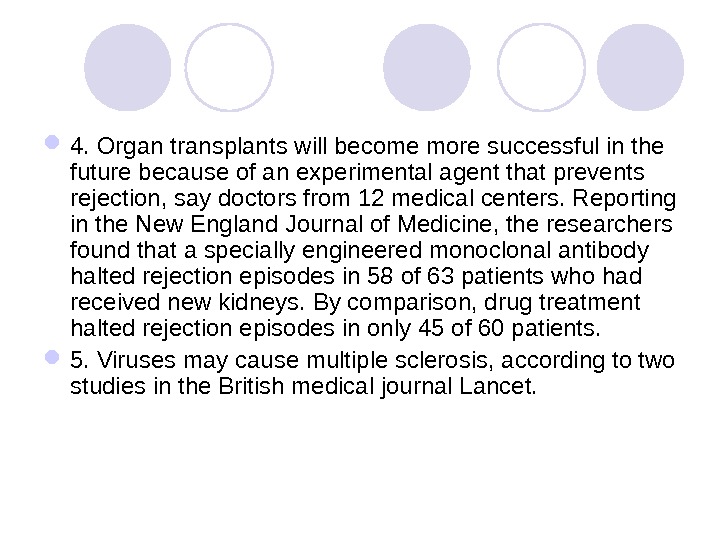
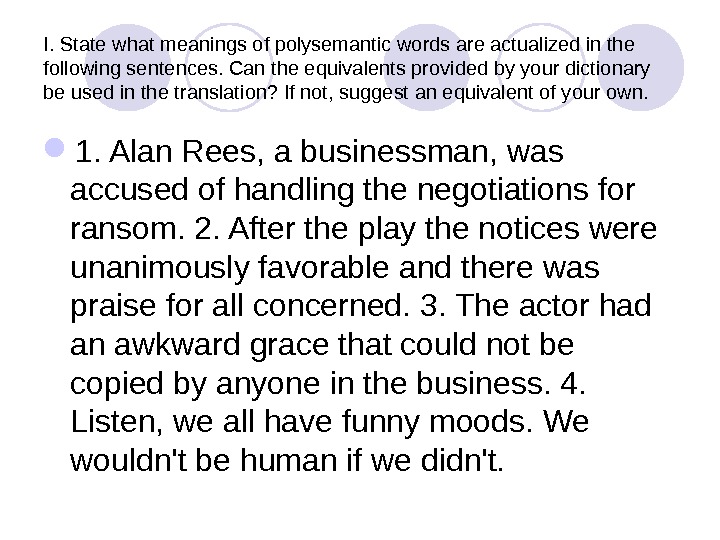
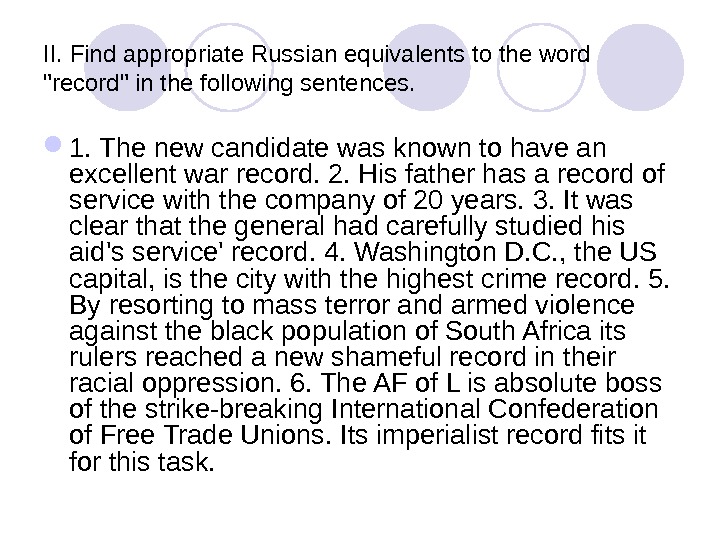
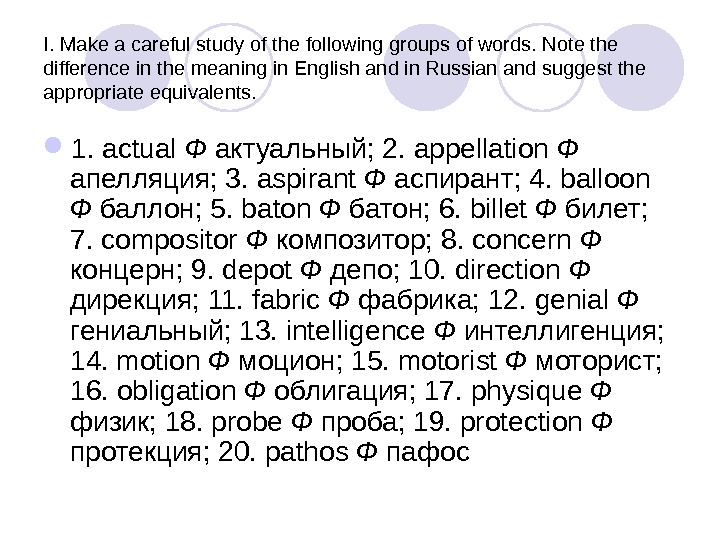
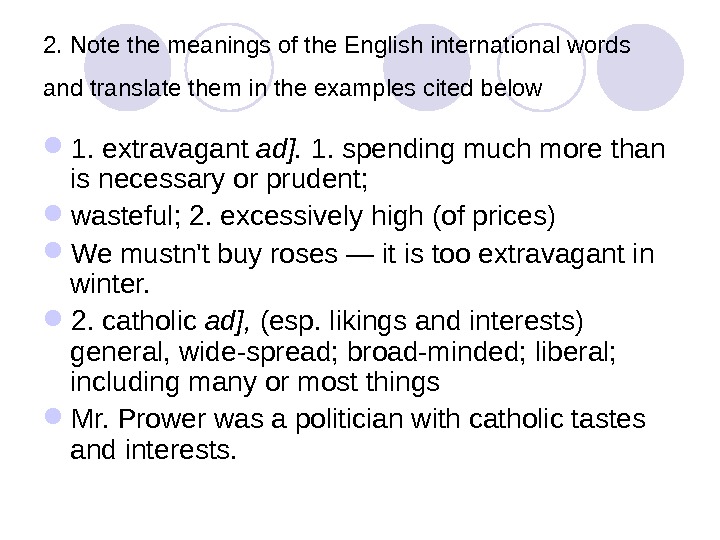
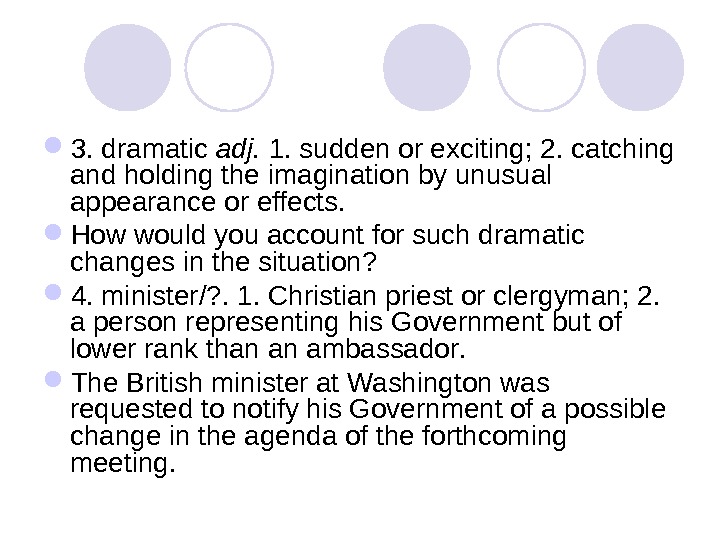
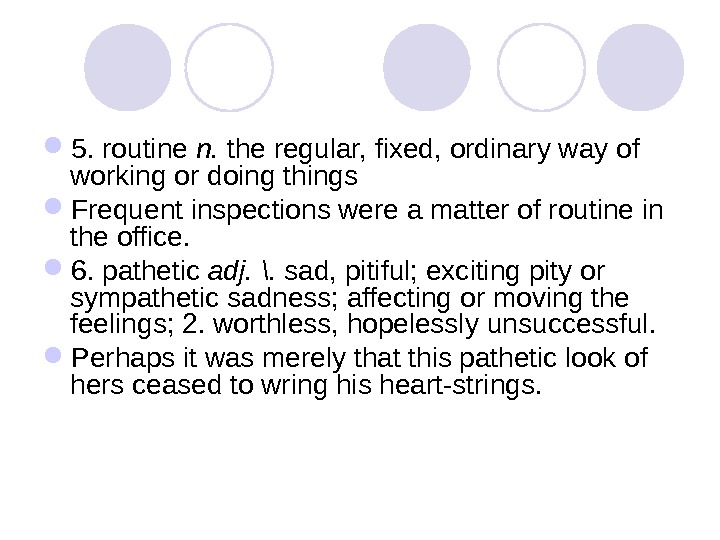
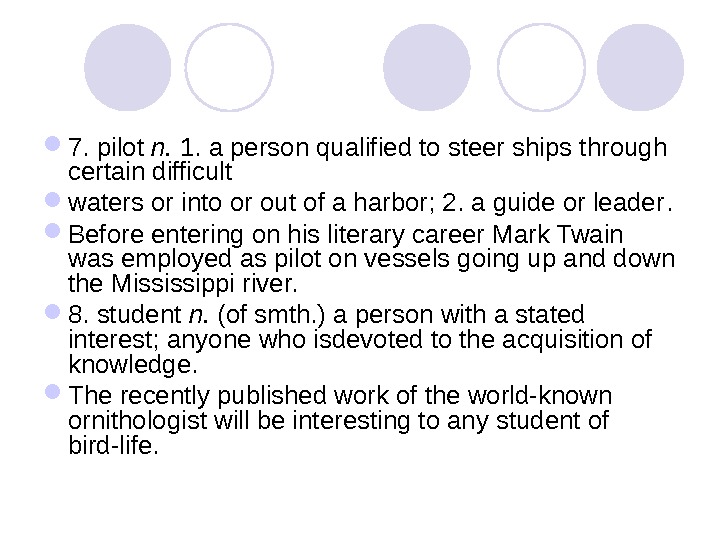
lect.4_lexical_problems_of_translation.ppt
- Размер: 1.6 Mегабайта
- Количество слайдов: 70
Описание презентации Презентация lect.4 LEXICAL PROBLEMS OF TRANSLATION по слайдам
 LEXICAL PROBLEMS OF TRANSLATION Lecture 4.
LEXICAL PROBLEMS OF TRANSLATION Lecture 4.
 Lexical problems The object of translation is not a ________________in which the SL words make up an integral whole. Though each word in the language has its own meaning, _____________________ depends, to a great extent, on its _______environment.
Lexical problems The object of translation is not a ________________in which the SL words make up an integral whole. Though each word in the language has its own meaning, _____________________ depends, to a great extent, on its _______environment.
 Lexical problems The _______ of any word in the text cannot be ___________________ to the specific context in which it is actualized.
Lexical problems The _______ of any word in the text cannot be ___________________ to the specific context in which it is actualized.
 Lexical problems Some words, however, are less ______ to the _____influence than others. There are words with_______, which are retained in _____, and are relatively________.
Lexical problems Some words, however, are less ______ to the _____influence than others. There are words with_______, which are retained in _____, and are relatively________.
 Handling context-free words Context-free words are mainly found among ___________________; among__________________; __________________. Context-free words have _____ equivalents in TL which, in most cases, can be used in TT.
Handling context-free words Context-free words are mainly found among ___________________; among__________________; __________________. Context-free words have _____ equivalents in TL which, in most cases, can be used in TT.
 Handling context-free words The ___________ of context-free words are often formed by _____ (with possible elements of_____) or________.
Handling context-free words The ___________ of context-free words are often formed by _____ (with possible elements of_____) or________.
 Handling context-free words Proper and geographical names are ______________, e. g. : Smith — Смит , Brown — Браун , John Fitzgerald Kennedy — Джон Фитцжеральд Кеннеди ; Cleveland — Кливленд , Rhode Island — Род — Айленд , Ontario — Онтарио ; Downing Street — Даунинг — стрит , Foley Square — Фоули — сквер.
Handling context-free words Proper and geographical names are ______________, e. g. : Smith — Смит , Brown — Браун , John Fitzgerald Kennedy — Джон Фитцжеральд Кеннеди ; Cleveland — Кливленд , Rhode Island — Род — Айленд , Ontario — Онтарио ; Downing Street — Даунинг — стрит , Foley Square — Фоули — сквер.
 Handling context-free words The same is true about the ____________________, e. g. : Life- Лайф » , US News and World Report — « ЮС ньюс энд уорлд рипорт » , General Motors Corporation — « Дженерал моторс корпорейшн » , Harriman and Brothers — « Гар — риман энд бразерс » , Anaconda Mining Company — « Анаконда майнинг компани » .
Handling context-free words The same is true about the ____________________, e. g. : Life- Лайф » , US News and World Report — « ЮС ньюс энд уорлд рипорт » , General Motors Corporation — « Дженерал моторс корпорейшн » , Harriman and Brothers — « Гар — риман энд бразерс » , Anaconda Mining Company — « Анаконда майнинг компани » .
 Handling context-free words Transcription is also used to reproduce in TL ________________________________ : Queen Elisabeth — «Ky ин Элизабет » , Spitfire — « Спитфайр » , Hawk — « Хок » , Trident — « Трайдент » , Honest John — « Онест Джон » .
Handling context-free words Transcription is also used to reproduce in TL ________________________________ : Queen Elisabeth — «Ky ин Элизабет » , Spitfire — « Спитфайр » , Hawk — « Хок » , Trident — « Трайдент » , Honest John — « Онест Джон » .
 Minor exceptions First , transcription is sometimes supplemented by ______________________________ are reproduced in TT instead of_____. (Dorset — Дорсет , Bonners Ferry — Боннер c Ферри )
Minor exceptions First , transcription is sometimes supplemented by ______________________________ are reproduced in TT instead of_____. (Dorset — Дорсет , Bonners Ferry — Боннер c Ферри )
 Minor exceptions Some elements of SL _____ are preserved so as to make the TL equivalent ______________________ (the Hercules missile — ракета « Геркулес » , Columbia — Колумбия ).
Minor exceptions Some elements of SL _____ are preserved so as to make the TL equivalent ______________________ (the Hercules missile — ракета « Геркулес » , Columbia — Колумбия ).
 Minor exceptions Second, there are some traditional exceptions in rendering the names of____________, e. g. : Charles I — Карл I, James II — Яков II, Edinborough — Эдинбург.
Minor exceptions Second, there are some traditional exceptions in rendering the names of____________, e. g. : Charles I — Карл I, James II — Яков II, Edinborough — Эдинбург.
 Handling context-free words Some _________ are made up of common nouns and are translated ____________________: the United States of America — Соединенные Штаты Америки , the United Kingdom — Соединенное Королевство , the Rocky Mountains — Скалистые горы.
Handling context-free words Some _________ are made up of common nouns and are translated ____________________: the United States of America — Соединенные Штаты Америки , the United Kingdom — Соединенное Королевство , the Rocky Mountains — Скалистые горы.
 Handling context-free words If the name includes both a_________________, the former is _______ while the latter is either ______ or ______or both: the Atlantic Ocean — Атлантический океан , Kansas City— Канзас — сити , New Hampshire — Нью — Хемпшир , Firth of Clyde — залив Ферт — оф — Кпайд.
Handling context-free words If the name includes both a_________________, the former is _______ while the latter is either ______ or ______or both: the Atlantic Ocean — Атлантический океан , Kansas City— Канзас — сити , New Hampshire — Нью — Хемпшир , Firth of Clyde — залив Ферт — оф — Кпайд.
 Handling context-free words Names of political parties, trade unions and similar bodies are usually ________________(with or without a change in the__________): the Republican Party — республиканская партия , the United Automobile Workers Union — Объединенный npo фсоюз рабочих автомобильной промышленности , the Federal Bureau of Investigation — Федеральное бюро расследований.
Handling context-free words Names of political parties, trade unions and similar bodies are usually ________________(with or without a change in the__________): the Republican Party — республиканская партия , the United Automobile Workers Union — Объединенный npo фсоюз рабочих автомобильной промышленности , the Federal Bureau of Investigation — Федеральное бюро расследований.
 Handling context-free words Terminological words are also relatively ______ though the context often helps to identify the specific field to which the term belongs. The context may also help to understand the ___________when it can denote more than one________.
Handling context-free words Terminological words are also relatively ______ though the context often helps to identify the specific field to which the term belongs. The context may also help to understand the ___________when it can denote more than one________.
 Handling context-free words Two common causes of translation errors: First, English and Russian terms can be ________but different__________. A «decade“, an «instrument“, a «department» (in the United States).
Handling context-free words Two common causes of translation errors: First, English and Russian terms can be ________but different__________. A «decade“, an «instrument“, a «department» (in the United States).
 Handling context-free words Second, the translator should find a proper Russian equivalent. A «packing industry” — « консервная промышленность » , «conventional armaments» — « обычные вооружения » and a «public school» in Britain — « частная школа » .
Handling context-free words Second, the translator should find a proper Russian equivalent. A «packing industry” — « консервная промышленность » , «conventional armaments» — « обычные вооружения » and a «public school» in Britain — « частная школа » .
 Handling context-free words Translation of technical terms puts a ___________________of ST. He must get familiar with the _______________ and make good use of technical dictionaries and other books of reference.
Handling context-free words Translation of technical terms puts a ___________________of ST. He must get familiar with the _______________ and make good use of technical dictionaries and other books of reference.
 HANDLING CONTEXT-BOUND WORDS All words have meanings of their own which are defined in ______ but the context may ___________ the word’s meaning, _____________ some part of its semantics. And before looking for an equivalent, the translator has to make ______ of the context to identify the _________of the word that should be rendered in translation.
HANDLING CONTEXT-BOUND WORDS All words have meanings of their own which are defined in ______ but the context may ___________ the word’s meaning, _____________ some part of its semantics. And before looking for an equivalent, the translator has to make ______ of the context to identify the _________of the word that should be rendered in translation.
 HANDLING CONTEXT-BOUND WORDS Most of the words are______, that is, they have________. As a rule, the word is used in the sentence in ________and the context must show what meaning has been _______ by the speaker and cut off all other meanings _______________of communication.
HANDLING CONTEXT-BOUND WORDS Most of the words are______, that is, they have________. As a rule, the word is used in the sentence in ________and the context must show what meaning has been _______ by the speaker and cut off all other meanings _______________of communication.
 HANDLING CONTEXT-BOUND WORDS No less important is the role of the context in translating the words with a ___________ whose equivalents are too _______ to be listed in any dictionary. Rate – 14 meanings in the dictionary.
HANDLING CONTEXT-BOUND WORDS No less important is the role of the context in translating the words with a ___________ whose equivalents are too _______ to be listed in any dictionary. Rate – 14 meanings in the dictionary.
 HANDLING EQUIVALENT-LACKING WORDS Many English words have________, and a number of ______ has been suggested for rendering the meanings of such equivalent-lacking words in TT.
HANDLING EQUIVALENT-LACKING WORDS Many English words have________, and a number of ______ has been suggested for rendering the meanings of such equivalent-lacking words in TT.
 HANDLING EQUIVALENT-LACKING WORDS When new words come into being to denote__________, they naturally cannot have _____________in another language. Therefore the translator coming across a _______ has to ______ its meaning and to choose the __________of rendering it in his translation.
HANDLING EQUIVALENT-LACKING WORDS When new words come into being to denote__________, they naturally cannot have _____________in another language. Therefore the translator coming across a _______ has to ______ its meaning and to choose the __________of rendering it in his translation.
 HANDLING EQUIVALENT-LACKING WORDS «In many European capitals central streets have been recently pedestrianized. ” «pedestrianize» — from the word «pedestrian» — « пешеход » and the verb-forming suffix -ize. « движение транспорта было запрещено » , « улицы были закрыты для транспорта » or « улицы были отведены только для пешеходов » .
HANDLING EQUIVALENT-LACKING WORDS «In many European capitals central streets have been recently pedestrianized. ” «pedestrianize» — from the word «pedestrian» — « пешеход » and the verb-forming suffix -ize. « движение транспорта было запрещено » , « улицы были закрыты для транспорта » or « улицы были отведены только для пешеходов » .
 Equivalent-lacking words referring to various SL realia The translator tries to transfer the name to TL by way of ____________________________. Many English words have been introduced in Russian in this way: « бейсбол » (baseball), « небоскреб » (skyscraper), « саквояжники » (carpet baggers), etc.
Equivalent-lacking words referring to various SL realia The translator tries to transfer the name to TL by way of ____________________________. Many English words have been introduced in Russian in this way: « бейсбол » (baseball), « небоскреб » (skyscraper), « саквояжники » (carpet baggers), etc.
 Equivalent-lacking words Quite a number of_______, however, still have _______ substitutes in Russian, and the translator has to look for an ______ each time he comes across such a word in the ST. “ Filibustering», «baby-sitter», «know-how», and many others.
Equivalent-lacking words Quite a number of_______, however, still have _______ substitutes in Russian, and the translator has to look for an ______ each time he comes across such a word in the ST. “ Filibustering», «baby-sitter», «know-how», and many others.
 Equivalent-lacking words Special attention should be paid to English ________________ which are often used differently from their ____________ in Russian and are, in fact, equivalent-lacking. Such common conjunctions as “_________» and some others are not ____________in translation and should be most carefully studied.
Equivalent-lacking words Special attention should be paid to English ________________ which are often used differently from their ____________ in Russian and are, in fact, equivalent-lacking. Such common conjunctions as “_________» and some others are not ____________in translation and should be most carefully studied.
 Equivalent-lacking words The same situation can be observed in case of ________________as -minded, -conscious, -oriented, -manship, etc. Such cases ____ the translator to ______to some semantic _________.
Equivalent-lacking words The same situation can be observed in case of ________________as -minded, -conscious, -oriented, -manship, etc. Such cases ____ the translator to ______to some semantic _________.
 HANDLING TRANSLATOR’S FALSE FRIENDS There are words in the source and target languages which are________________. Such words are of great interest to the translator since he is ________ to take this _______for the _________ and to regard the words that look alike as______________.
HANDLING TRANSLATOR’S FALSE FRIENDS There are words in the source and target languages which are________________. Such words are of great interest to the translator since he is ________ to take this _______for the _________ and to regard the words that look alike as______________.
 HANDLING TRANSLATOR’S FALSE FRIENDS Very few ________have the same meanings in________. “ Parliament, theorem, diameter» and their Russian counterparts « парламент , теорема , диаметр » .
HANDLING TRANSLATOR’S FALSE FRIENDS Very few ________have the same meanings in________. “ Parliament, theorem, diameter» and their Russian counterparts « парламент , теорема , диаметр » .
 HANDLING TRANSLATOR’S FALSE FRIENDS In most cases, however, the semantics of such words in English and in Russian does not _______ and they should ____ «pseudointernational». Their ________suggesting that they are________ , is, therefore, deceptive and may lead to translation errors.
HANDLING TRANSLATOR’S FALSE FRIENDS In most cases, however, the semantics of such words in English and in Russian does not _______ and they should ____ «pseudointernational». Their ________suggesting that they are________ , is, therefore, deceptive and may lead to translation errors.
 HANDLING TRANSLATOR’S FALSE FRIENDS For that reason they are often referred to as the ______________________ «decade, complexion, lunatic” and the like. ( Десятилетие , цвет лица , сумасшедший ).
HANDLING TRANSLATOR’S FALSE FRIENDS For that reason they are often referred to as the ______________________ «decade, complexion, lunatic” and the like. ( Десятилетие , цвет лица , сумасшедший ).
 Lexical transformations • Lexical transformations are not simple special methods of translation. • They are the methods of ____ • _______by means of which we convey meanings of foreign words in the context and find their _____________of translation which do not ____ with a dictionary.
Lexical transformations • Lexical transformations are not simple special methods of translation. • They are the methods of ____ • _______by means of which we convey meanings of foreign words in the context and find their _____________of translation which do not ____ with a dictionary.
 Reasons for making LT There are four reasons for using lexical transformations: different languages choose ________of the same phenomenon or ____in the meaning of the word, e. g. glasses- очки school leaver — выпускник
Reasons for making LT There are four reasons for using lexical transformations: different languages choose ________of the same phenomenon or ____in the meaning of the word, e. g. glasses- очки school leaver — выпускник
 Reasons for making LT differences in the ______ of the word. e. g. brittle- хрупкий, ломкий ( English word is wider) additional meaning: brittle temper – вспыльчивый характер, brittle manner – нервная манера ; but “ хрупкое здоровье ” — delicate health ( not brittle health).
Reasons for making LT differences in the ______ of the word. e. g. brittle- хрупкий, ломкий ( English word is wider) additional meaning: brittle temper – вспыльчивый характер, brittle manner – нервная манера ; but “ хрупкое здоровье ” — delicate health ( not brittle health).
 Reasons for making LT different_________. e. g. trains run – поезда ходят ; rich feedings- щедрое угощение ;
Reasons for making LT different_________. e. g. trains run – поезда ходят ; rich feedings- щедрое угощение ;
 Reasons for making LT there are traditional for each language______________. It can be different clichés, orders and so on. e. g. no smoking — курить запрещено
Reasons for making LT there are traditional for each language______________. It can be different clichés, orders and so on. e. g. no smoking — курить запрещено
 Reasons for making LT A word may be more widely used in one language, while in another it may have a _____ or even ___________meaning. The choice of one of the meanings of a word depends merely upon the________________.
Reasons for making LT A word may be more widely used in one language, while in another it may have a _____ or even ___________meaning. The choice of one of the meanings of a word depends merely upon the________________.
 Reasons for making LT The choice of a ______may depend upon different _____ of a word. In case of ______ everything depends upon the environment of the word which usually _____ the meaning of the word.
Reasons for making LT The choice of a ______may depend upon different _____ of a word. In case of ______ everything depends upon the environment of the word which usually _____ the meaning of the word.
 Definition Translation transformation is ……………………. . of structural and semantic ……………. between the source and translation texts. Transformations can be lexical, grammatical and lexical-grammatical.
Definition Translation transformation is ……………………. . of structural and semantic ……………. between the source and translation texts. Transformations can be lexical, grammatical and lexical-grammatical.
 Lexical transformations: Transcription / transliteration; Descriptive way of translation; Word-for-word translation; Concretization; Compensation; Generalization; Antonymic translation; Functional substitution; Logical (sense) development.
Lexical transformations: Transcription / transliteration; Descriptive way of translation; Word-for-word translation; Concretization; Compensation; Generalization; Antonymic translation; Functional substitution; Logical (sense) development.
 Lexical transformations Concretization is a linguistic case when the SL word or word combination with _________ is replaced by the TL word or word combination with____________. e. g. Have you had your meal? Вы уже позавтракали ?
Lexical transformations Concretization is a linguistic case when the SL word or word combination with _________ is replaced by the TL word or word combination with____________. e. g. Have you had your meal? Вы уже позавтракали ?
 Lexical transformations Generalization is a case when the SL word with some _________ is substituted for the TL word with _________ semantic meaning. e. g. He visits Jane every weekend. Он навещает Джейн каждую неделю.
Lexical transformations Generalization is a case when the SL word with some _________ is substituted for the TL word with _________ semantic meaning. e. g. He visits Jane every weekend. Он навещает Джейн каждую неделю.
 Lexical transformations • Logical development is the _______of one notion by another provided that they are_______ • ____________. • e. g. acid test – лакмусовая бумажка.
Lexical transformations • Logical development is the _______of one notion by another provided that they are_______ • ____________. • e. g. acid test – лакмусовая бумажка.
 Lexical transformations Antonymic translation is a complex system of lexical-grammatical substitutions in the process of which _____ sentences and _____ constructions are substituted for the TL _______ ones, or one word for its______. e. g. Never drink unboiled water – пейте только кипяченую воду.
Lexical transformations Antonymic translation is a complex system of lexical-grammatical substitutions in the process of which _____ sentences and _____ constructions are substituted for the TL _______ ones, or one word for its______. e. g. Never drink unboiled water – пейте только кипяченую воду.
 Lexical transformations Compensation is the complex replacement by means of which the________ in one place of the SL text is rendered in another and quite often by _______in the TL text.
Lexical transformations Compensation is the complex replacement by means of which the________ in one place of the SL text is rendered in another and quite often by _______in the TL text.
 Lexical transformations We resort to compensation in order to ____________ of the original text. e. g. entailment (запутанность, затруднительное положение) перевод: «когда тебе прищемят хвост» .
Lexical transformations We resort to compensation in order to ____________ of the original text. e. g. entailment (запутанность, затруднительное положение) перевод: «когда тебе прищемят хвост» .
 Lexical transformations Descriptive way of translation — is usually used together with ______and used to translate terms, unique objects, special cultural notions. e. g. krujalo — wing-shaped base of cupola of the wooden church.
Lexical transformations Descriptive way of translation — is usually used together with ______and used to translate terms, unique objects, special cultural notions. e. g. krujalo — wing-shaped base of cupola of the wooden church.
 Lexical transformations Functional substitution — is used, when no one of the ______ given in the dictionary suit in a particular context. It is used while translating ______or words which are not fixed in the dictionaries. e. g. French window — стеклянные двери. Mushroom millionaire – ч-к, который быстро разбогател.
Lexical transformations Functional substitution — is used, when no one of the ______ given in the dictionary suit in a particular context. It is used while translating ______or words which are not fixed in the dictionaries. e. g. French window — стеклянные двери. Mushroom millionaire – ч-к, который быстро разбогател.
 Lexical transformations Transcription/Transliteration — is used, when we reproduce ______or ______of the SL by means of ______ or ______of the TL. We usually transcribe or transliterate proper and geographical names, sport teams, titles of periodicals, names of firms, corporations, etc. e. g. Minnesota- Миннесота , Michigan – Мичиган.
Lexical transformations Transcription/Transliteration — is used, when we reproduce ______or ______of the SL by means of ______ or ______of the TL. We usually transcribe or transliterate proper and geographical names, sport teams, titles of periodicals, names of firms, corporations, etc. e. g. Minnesota- Миннесота , Michigan – Мичиган.
 Lexical transformations Word-for-word translation — when we reproduce not the __________but elements of the __________when components of the combination are translated by respective elements of TL. e. g. Supreme Court- Верховный Суд The united States of America – Соединенные Штаты Америки.
Lexical transformations Word-for-word translation — when we reproduce not the __________but elements of the __________when components of the combination are translated by respective elements of TL. e. g. Supreme Court- Верховный Суд The united States of America – Соединенные Штаты Америки.
 Questions for the seminar: Петренко Н. М. Практикум з перекладу pp. 26 ex. 1, 4, 5, 10. pp. 36 -37 ex. 6 Definitions of all the lexical transformations with your own examples.
Questions for the seminar: Петренко Н. М. Практикум з перекладу pp. 26 ex. 1, 4, 5, 10. pp. 36 -37 ex. 6 Definitions of all the lexical transformations with your own examples.
 Exercises I. Suggest the Russian substitutes for the following names and titles. 1. Washington Irving, Edgar Allan Рое , Dorothy Parker, James Thurber, James I, Langston Hughes, Charles Evans Hughes, Charles III, Victor Hugo, Du. Pont, Watt Hugh Mc. Collum, Mike Quin, Art Buchwald, Nataniel Hawthorne, Ambrose Bierce, William Parker, William IV, Mitchell Wilson, Woodrow Wilson
Exercises I. Suggest the Russian substitutes for the following names and titles. 1. Washington Irving, Edgar Allan Рое , Dorothy Parker, James Thurber, James I, Langston Hughes, Charles Evans Hughes, Charles III, Victor Hugo, Du. Pont, Watt Hugh Mc. Collum, Mike Quin, Art Buchwald, Nataniel Hawthorne, Ambrose Bierce, William Parker, William IV, Mitchell Wilson, Woodrow Wilson
 2. Albany, New South Wales, Santa Anna (Calif), Firth of Tay, Ivory Coast, New Orleans, New Hampshire, Utah, Wyoming, New Mexico, Blenheim, Webster Springs, Wells River, Red Lake, East Greenwich, Munich, West Rocky River, West Delaware River, Cornwall, Zurich, Cape Verde Islands
2. Albany, New South Wales, Santa Anna (Calif), Firth of Tay, Ivory Coast, New Orleans, New Hampshire, Utah, Wyoming, New Mexico, Blenheim, Webster Springs, Wells River, Red Lake, East Greenwich, Munich, West Rocky River, West Delaware River, Cornwall, Zurich, Cape Verde Islands
 3. Downing Street, Whitehall, Wigmore Hall, Windsor Castle, Festival Gardens, Fifth Avenue, Trafalgar Square, Charing Cross, Haymarket Theatre, Harley Street, Mansion House, Lombard Street
3. Downing Street, Whitehall, Wigmore Hall, Windsor Castle, Festival Gardens, Fifth Avenue, Trafalgar Square, Charing Cross, Haymarket Theatre, Harley Street, Mansion House, Lombard Street
 4. National Bank; Associated British Foods; Aluminium Company of Canada, Ltd; Standard Oil of New Jersey, Imperial Group; London, Midland Scottish Railway; London Broadcasting Company; Warner Brothers; Butterworth and Dickenson, textile engineers; Independent Television News; Associated Press 5. Financial Times, Labour Weekly, New York Herald Tribune, Wall Street Journal, Political Affairs, Morning Star, Paris Soir
4. National Bank; Associated British Foods; Aluminium Company of Canada, Ltd; Standard Oil of New Jersey, Imperial Group; London, Midland Scottish Railway; London Broadcasting Company; Warner Brothers; Butterworth and Dickenson, textile engineers; Independent Television News; Associated Press 5. Financial Times, Labour Weekly, New York Herald Tribune, Wall Street Journal, Political Affairs, Morning Star, Paris Soir
 2. Translate the following sentences with particular attention to the way the proper and geographical names should be rendered into Russian. 1. A tourist’s heart may leap at first sight of the Thames as it cuts through the heart of London because of the spectacle of massed totems such as Parliament, Whitehall, St. Paul’s Cathedral and the Tower of London that rise majestically near it, and the 15 bridges bearing storybook names and images: Westminster, Waterloo, Blackbriars, London Bridge and Tower Bridge. But nearly everything worth the price of a snapshot sits on the northern bank.
2. Translate the following sentences with particular attention to the way the proper and geographical names should be rendered into Russian. 1. A tourist’s heart may leap at first sight of the Thames as it cuts through the heart of London because of the spectacle of massed totems such as Parliament, Whitehall, St. Paul’s Cathedral and the Tower of London that rise majestically near it, and the 15 bridges bearing storybook names and images: Westminster, Waterloo, Blackbriars, London Bridge and Tower Bridge. But nearly everything worth the price of a snapshot sits on the northern bank.
 2. After the death of Charles I in 1649 puritanical attitudes to the visual arts did not favour the development of architecture and the destruction, begun under Henry VIII, was renewed during and after Civil War (1642 -1646). Whatever the merits of government under Cromwell it was a sad period for architecture.
2. After the death of Charles I in 1649 puritanical attitudes to the visual arts did not favour the development of architecture and the destruction, begun under Henry VIII, was renewed during and after Civil War (1642 -1646). Whatever the merits of government under Cromwell it was a sad period for architecture.
 3. Another change which affected architecture was the growth of an educated middle class. From Chaucer to Shakespeare, to Ben Jonson and Inigo Jones, to Wren and Newton, to Hume, Gibbon and Robert Adam and on to Soane, Carlyle, Ruskin and Morris, the «middling sort of people» were taking over and amplifying the secular role which had been played by clergy in earlier times when clerics were almost the only people who could read and write.
3. Another change which affected architecture was the growth of an educated middle class. From Chaucer to Shakespeare, to Ben Jonson and Inigo Jones, to Wren and Newton, to Hume, Gibbon and Robert Adam and on to Soane, Carlyle, Ruskin and Morris, the «middling sort of people» were taking over and amplifying the secular role which had been played by clergy in earlier times when clerics were almost the only people who could read and write.
 3. Translate the following words and collocations. Explain your choice of the type of equivalents. 1. administrative efficiency; 2. arbitration; 3. affidavit; 4. Attorney-General; 5. balance of payments; 6. adverse trade balance; 7. to stuff the ballot; 8. casting vote; 9. close vote; 10. back-bencher; 11. to bail out; 12. election returns; 13. brinkmanship; 14. job bias; 15. political bias; 16. brain drain; 17. State of the Union message; 18. income tax; 19. frame-up; 20. career diplomat; 21. red-baiting campaign; 22. breakthrough; 23. bread-line; 24. circumstantial evidence; 25. gerrymandering; 26. craft union; 27. open shop system; 28. brain washing; 29. non-contiguous States; 30. company checkers; 31. contempt of court; 32. crippling taxes; 33. polling date; 34. defendant; 35. color-blind; 36. conglomerate; 37. social work; 38. the Chief Executive; 39. hardware; 40. software
3. Translate the following words and collocations. Explain your choice of the type of equivalents. 1. administrative efficiency; 2. arbitration; 3. affidavit; 4. Attorney-General; 5. balance of payments; 6. adverse trade balance; 7. to stuff the ballot; 8. casting vote; 9. close vote; 10. back-bencher; 11. to bail out; 12. election returns; 13. brinkmanship; 14. job bias; 15. political bias; 16. brain drain; 17. State of the Union message; 18. income tax; 19. frame-up; 20. career diplomat; 21. red-baiting campaign; 22. breakthrough; 23. bread-line; 24. circumstantial evidence; 25. gerrymandering; 26. craft union; 27. open shop system; 28. brain washing; 29. non-contiguous States; 30. company checkers; 31. contempt of court; 32. crippling taxes; 33. polling date; 34. defendant; 35. color-blind; 36. conglomerate; 37. social work; 38. the Chief Executive; 39. hardware; 40. software
 4. Analyse the terminological units in the following sentences and suggest the way they should be translated into Russian. 1. We, the human race have braved the violent electromagnetic Aura around Jupiter and photographed its puzzling moons. 2. Once established, aspen seedlings tend to reproduce themselves vegetatively by root suckering. 3. General Motors, Ford and Chrysler combine autos and computers in novel ways. They offer such features as self-adjusted suspensions, sensors, that alter fuel mixture for efficient combustion and systems that diagnose a car’s mechanical troubles.
4. Analyse the terminological units in the following sentences and suggest the way they should be translated into Russian. 1. We, the human race have braved the violent electromagnetic Aura around Jupiter and photographed its puzzling moons. 2. Once established, aspen seedlings tend to reproduce themselves vegetatively by root suckering. 3. General Motors, Ford and Chrysler combine autos and computers in novel ways. They offer such features as self-adjusted suspensions, sensors, that alter fuel mixture for efficient combustion and systems that diagnose a car’s mechanical troubles.
 4. Organ transplants will become more successful in the future because of an experimental agent that prevents rejection, say doctors from 12 medical centers. Reporting in the New England Journal of Medicine, the researchers found that a specially engineered monoclonal antibody halted rejection episodes in 58 of 63 patients who had received new kidneys. By comparison, drug treatment halted rejection episodes in only 45 of 60 patients. 5. Viruses may cause multiple sclerosis, according to two studies in the British medical journal Lancet.
4. Organ transplants will become more successful in the future because of an experimental agent that prevents rejection, say doctors from 12 medical centers. Reporting in the New England Journal of Medicine, the researchers found that a specially engineered monoclonal antibody halted rejection episodes in 58 of 63 patients who had received new kidneys. By comparison, drug treatment halted rejection episodes in only 45 of 60 patients. 5. Viruses may cause multiple sclerosis, according to two studies in the British medical journal Lancet.
 I. State what meanings of polysemantic words are actualized in the following sentences. Can the equivalents provided by your dictionary be used in the translation? If not, suggest an equivalent of your own. 1. Alan Rees, a businessman, was accused of handling the negotiations for ransom. 2. After the play the notices were unanimously favorable and there was praise for all concerned. 3. The actor had an awkward grace that could not be copied by anyone in the business. 4. Listen, we all have funny moods. We wouldn’t be human if we didn’t.
I. State what meanings of polysemantic words are actualized in the following sentences. Can the equivalents provided by your dictionary be used in the translation? If not, suggest an equivalent of your own. 1. Alan Rees, a businessman, was accused of handling the negotiations for ransom. 2. After the play the notices were unanimously favorable and there was praise for all concerned. 3. The actor had an awkward grace that could not be copied by anyone in the business. 4. Listen, we all have funny moods. We wouldn’t be human if we didn’t.
 II. Find appropriate Russian equivalents to the word «record» in the following sentences. 1. The new candidate was known to have an excellent war record. 2. His father has a record of service with the company of 20 years. 3. It was clear that the general had carefully studied his aid’s service’ record. 4. Washington D. C. , the US capital, is the city with the highest crime record. 5. By resorting to mass terror and armed violence against the black population of South Africa its rulers reached a new shameful record in their racial oppression. 6. The AF of L is absolute boss of the strike-breaking International Confederation of Free Trade Unions. Its imperialist record fits it for this task.
II. Find appropriate Russian equivalents to the word «record» in the following sentences. 1. The new candidate was known to have an excellent war record. 2. His father has a record of service with the company of 20 years. 3. It was clear that the general had carefully studied his aid’s service’ record. 4. Washington D. C. , the US capital, is the city with the highest crime record. 5. By resorting to mass terror and armed violence against the black population of South Africa its rulers reached a new shameful record in their racial oppression. 6. The AF of L is absolute boss of the strike-breaking International Confederation of Free Trade Unions. Its imperialist record fits it for this task.
 I. Make a careful study of the following groups of words. Note the difference in the meaning in English and in Russian and suggest the appropriate equivalents. 1. actual Ф актуальный ; 2. appellation Ф апелляция ; 3. aspirant Ф аспирант ; 4. balloon Ф баллон ; 5. baton Ф батон ; 6. billet Ф билет ; 7. compositor Ф композитор ; 8. concern Ф концерн ; 9. depot Ф депо ; 10. direction Ф дирекция ; 11. fabric Ф фабрика ; 12. genial Ф гениальный ; 13. intelligence Ф интеллигенция ; 14. motion Ф моцион ; 15. motorist Ф моторист ; 16. obligation Ф облигация ; 17. physique Ф физик ; 18. probe Ф проба ; 19. protection Ф протекция ; 20. pathos Ф пафос
I. Make a careful study of the following groups of words. Note the difference in the meaning in English and in Russian and suggest the appropriate equivalents. 1. actual Ф актуальный ; 2. appellation Ф апелляция ; 3. aspirant Ф аспирант ; 4. balloon Ф баллон ; 5. baton Ф батон ; 6. billet Ф билет ; 7. compositor Ф композитор ; 8. concern Ф концерн ; 9. depot Ф депо ; 10. direction Ф дирекция ; 11. fabric Ф фабрика ; 12. genial Ф гениальный ; 13. intelligence Ф интеллигенция ; 14. motion Ф моцион ; 15. motorist Ф моторист ; 16. obligation Ф облигация ; 17. physique Ф физик ; 18. probe Ф проба ; 19. protection Ф протекция ; 20. pathos Ф пафос
 2. Note the meanings of the English international words and translate them in the examples cited below 1. extravagant ad]. 1. spending much more than is necessary or prudent; wasteful; 2. excessively high (of prices) We mustn’t buy roses — it is too extravagant in winter. 2. catholic ad], (esp. likings and interests) general, wide-spread; broad-minded; liberal; including many or most things Mr. Prower was a politician with catholic tastes and interests.
2. Note the meanings of the English international words and translate them in the examples cited below 1. extravagant ad]. 1. spending much more than is necessary or prudent; wasteful; 2. excessively high (of prices) We mustn’t buy roses — it is too extravagant in winter. 2. catholic ad], (esp. likings and interests) general, wide-spread; broad-minded; liberal; including many or most things Mr. Prower was a politician with catholic tastes and interests.
 3. dramatic adj. 1. sudden or exciting; 2. catching and holding the imagination by unusual appearance or effects. How would you account for such dramatic changes in the situation? 4. minister/? . 1. Christian priest or clergyman; 2. a person representing his Government but of lower rank than an ambassador. The British minister at Washington was requested to notify his Government of a possible change in the agenda of the forthcoming meeting.
3. dramatic adj. 1. sudden or exciting; 2. catching and holding the imagination by unusual appearance or effects. How would you account for such dramatic changes in the situation? 4. minister/? . 1. Christian priest or clergyman; 2. a person representing his Government but of lower rank than an ambassador. The British minister at Washington was requested to notify his Government of a possible change in the agenda of the forthcoming meeting.
 5. routine n. the regular, fixed, ordinary way of working or doing things Frequent inspections were a matter of routine in the office. 6. pathetic adj. \. sad, pitiful; exciting pity or sympathetic sadness; affecting or moving the feelings; 2. worthless, hopelessly unsuccessful. Perhaps it was merely that this pathetic look of hers ceased to wring his heart-strings.
5. routine n. the regular, fixed, ordinary way of working or doing things Frequent inspections were a matter of routine in the office. 6. pathetic adj. \. sad, pitiful; exciting pity or sympathetic sadness; affecting or moving the feelings; 2. worthless, hopelessly unsuccessful. Perhaps it was merely that this pathetic look of hers ceased to wring his heart-strings.
 7. pilot n. 1. a person qualified to steer ships through certain difficult waters or into or out of a harbor; 2. a guide or leader. Before entering on his literary career Mark Twain was employed as pilot on vessels going up and down the Mississippi river. 8. student n. (of smth. ) a person with a stated interest; anyone who isdevoted to the acquisition of knowledge. The recently published work of the world-known ornithologist will be interesting to any student of bird-life.
7. pilot n. 1. a person qualified to steer ships through certain difficult waters or into or out of a harbor; 2. a guide or leader. Before entering on his literary career Mark Twain was employed as pilot on vessels going up and down the Mississippi river. 8. student n. (of smth. ) a person with a stated interest; anyone who isdevoted to the acquisition of knowledge. The recently published work of the world-known ornithologist will be interesting to any student of bird-life.

